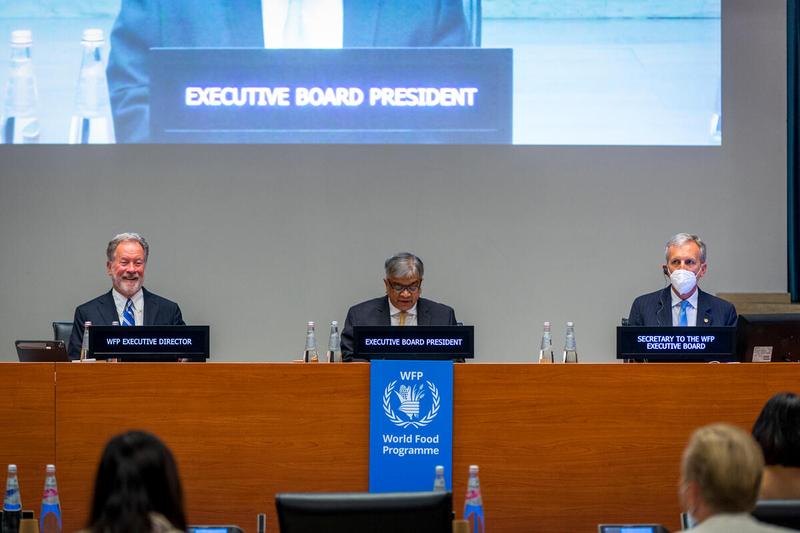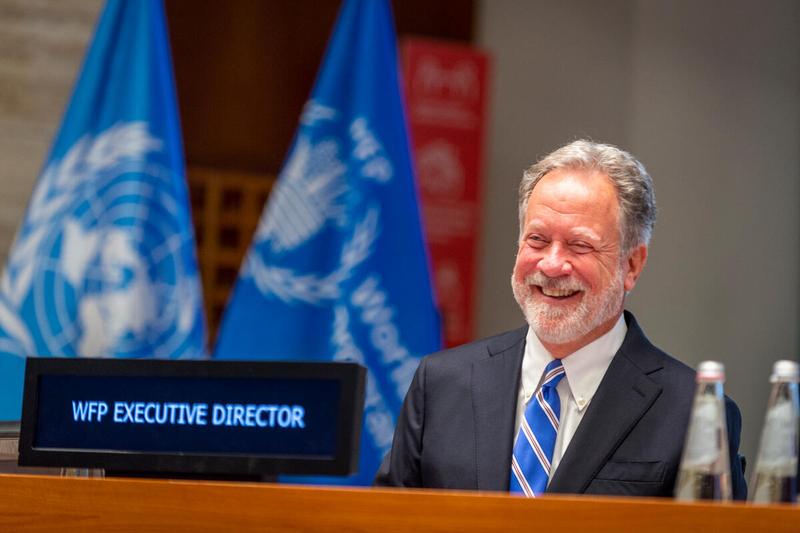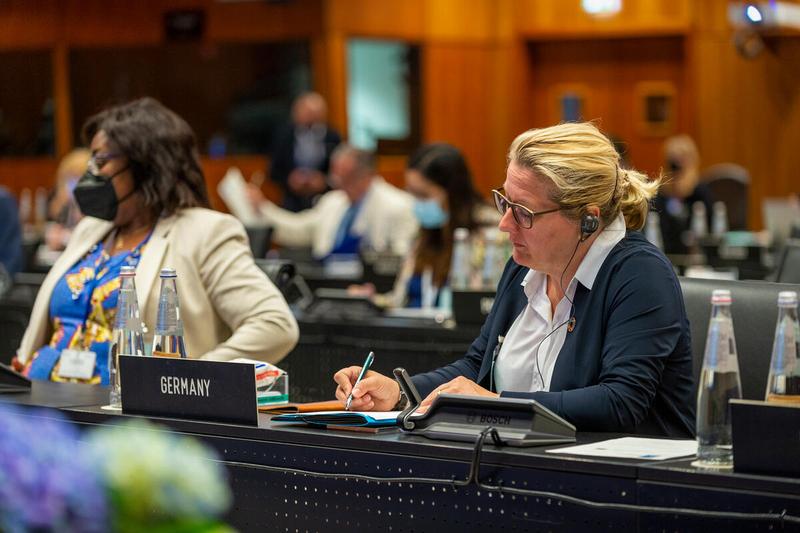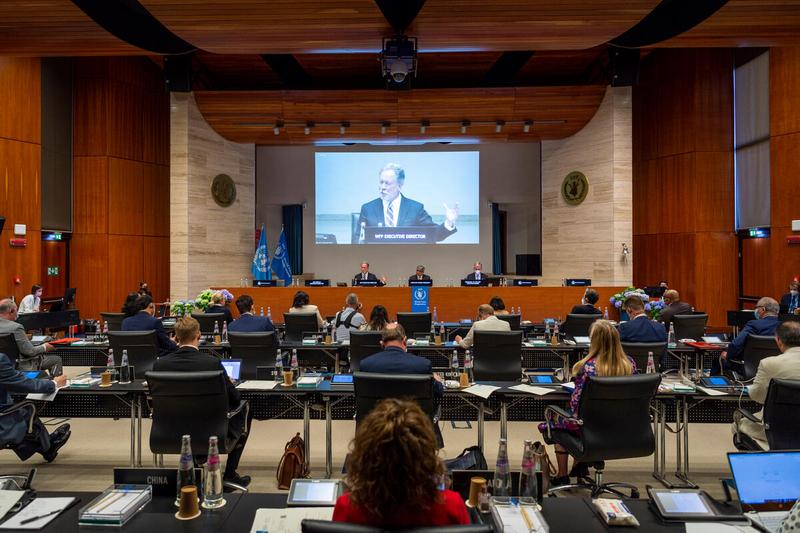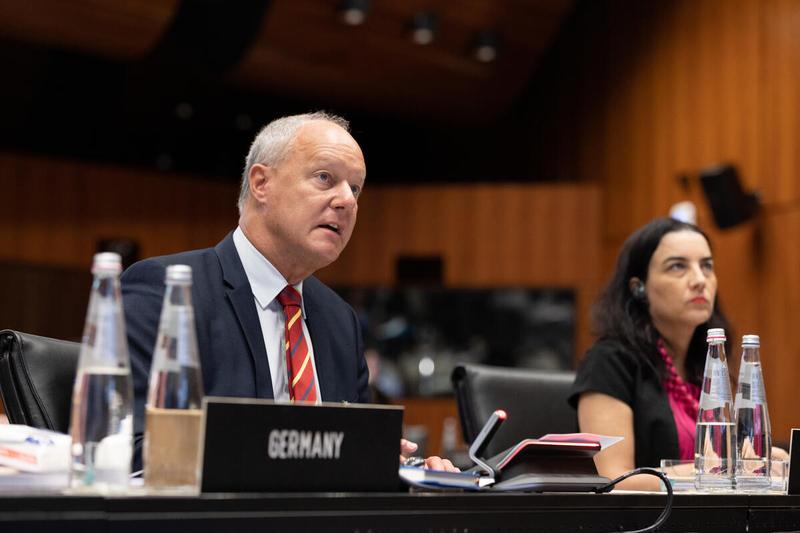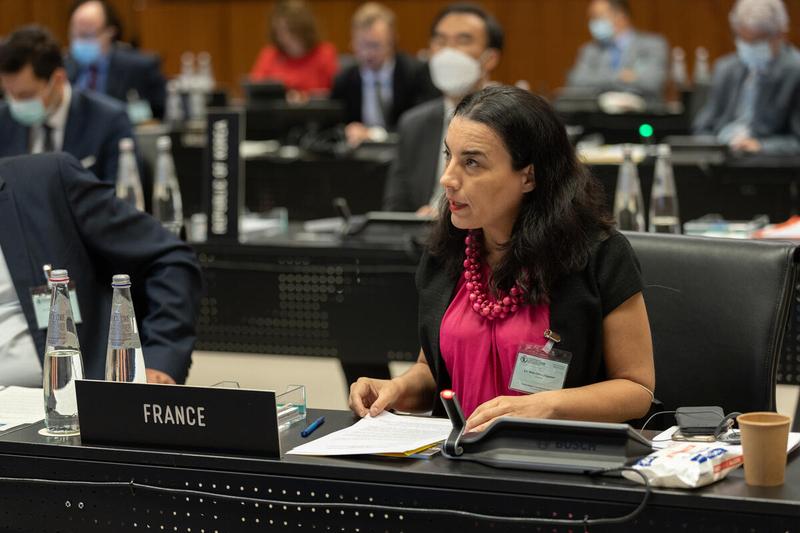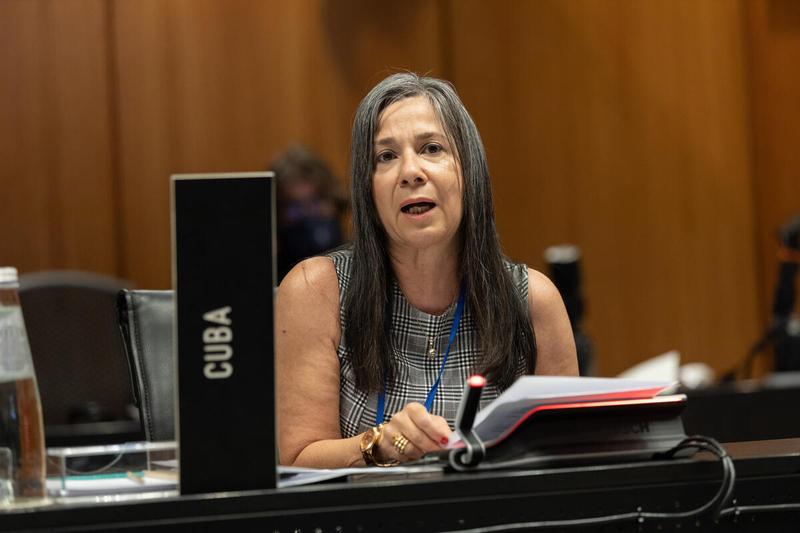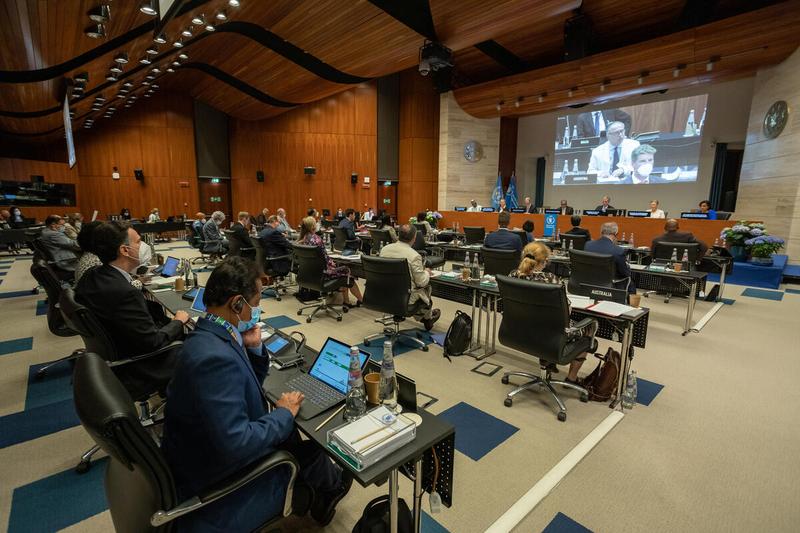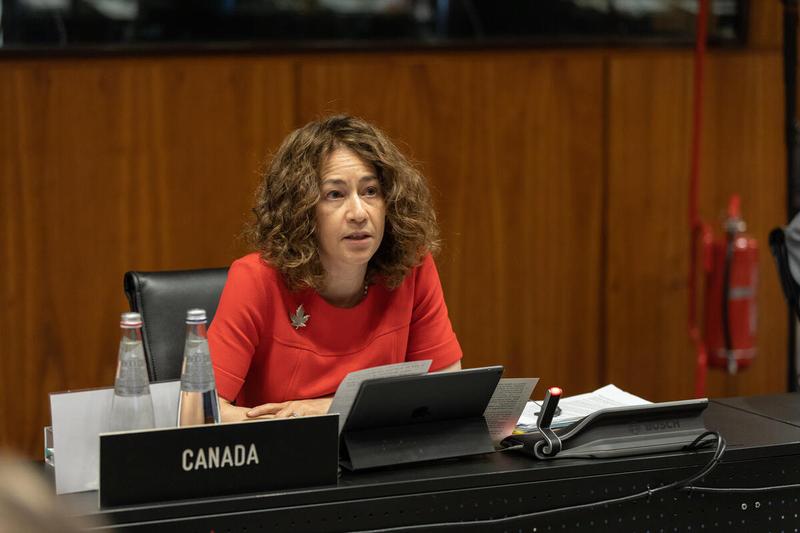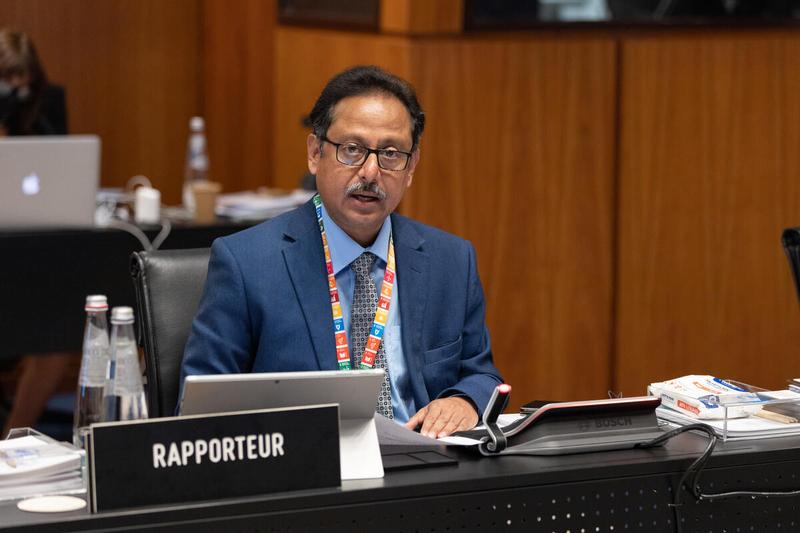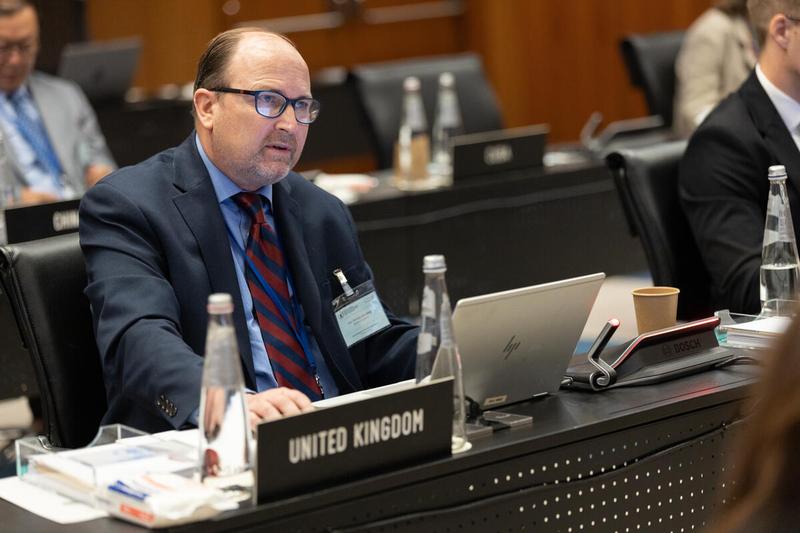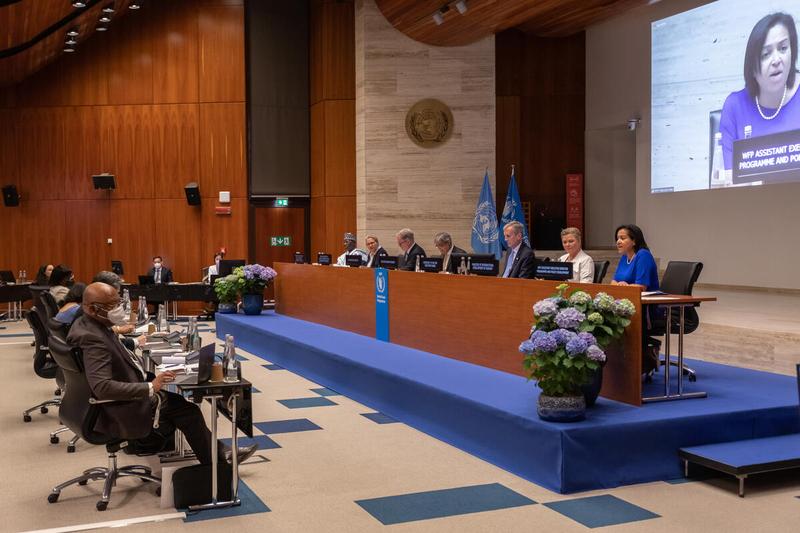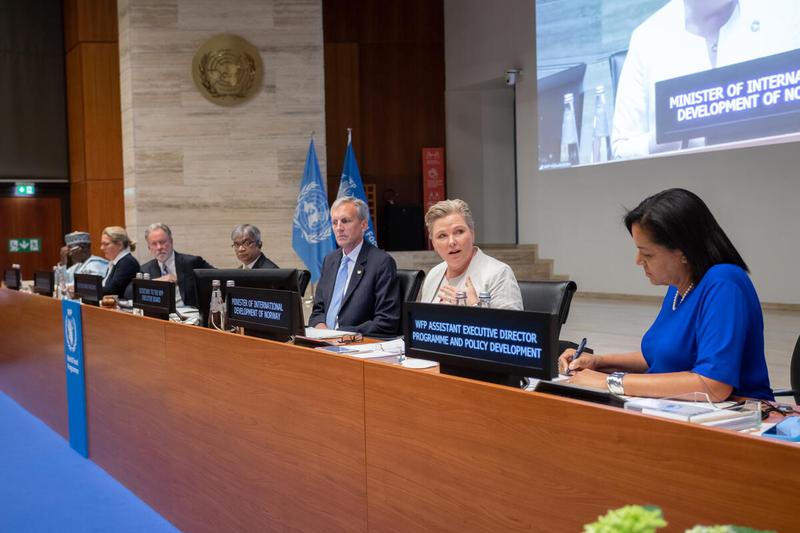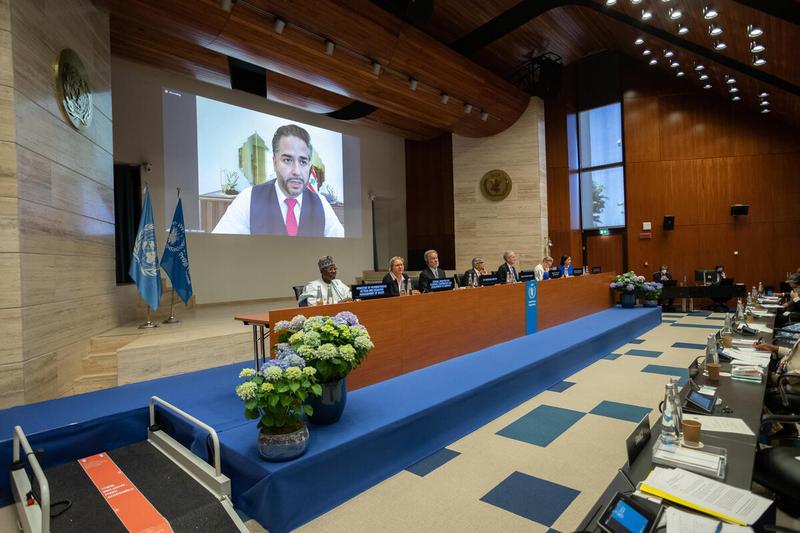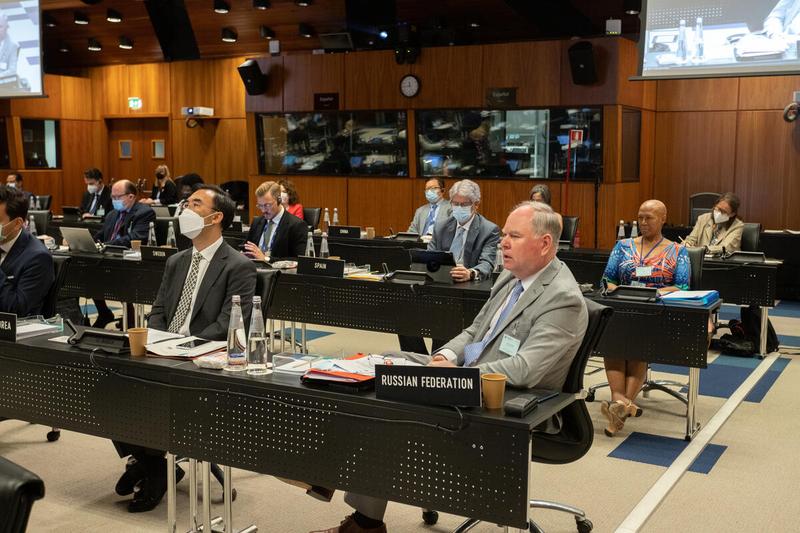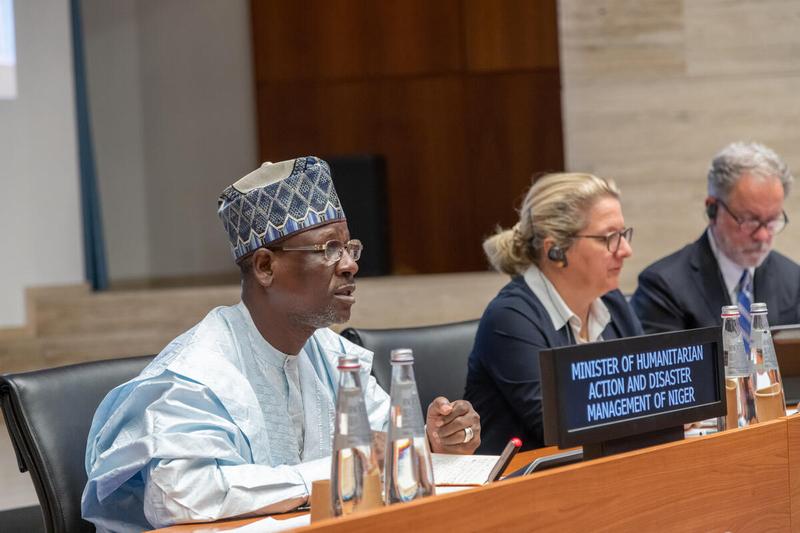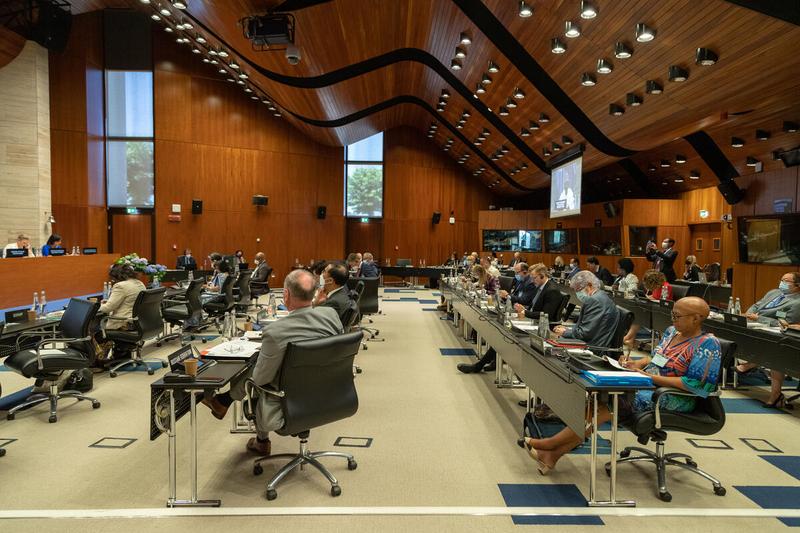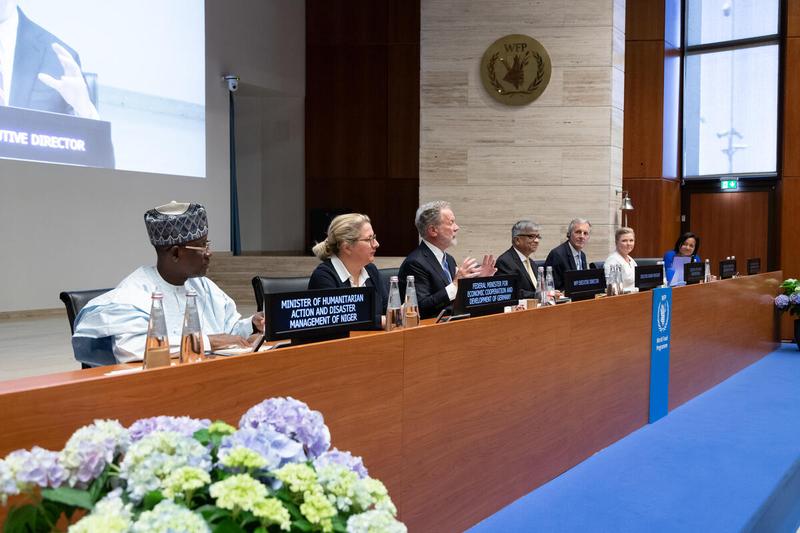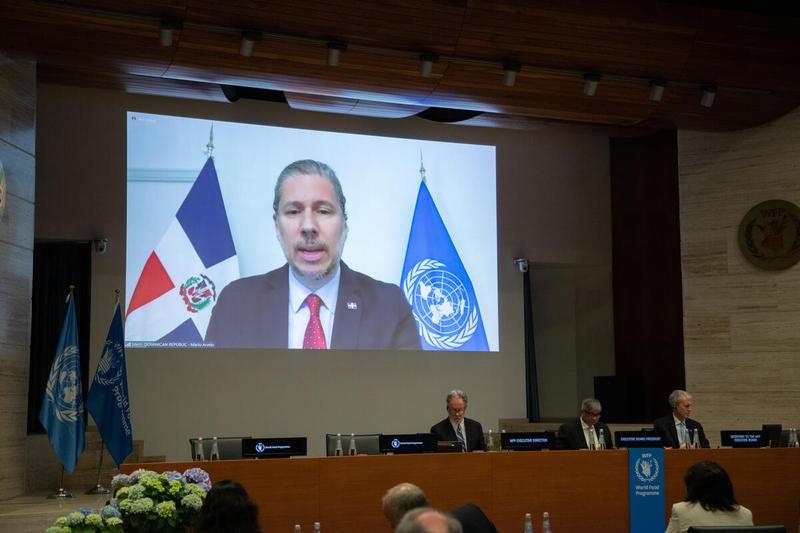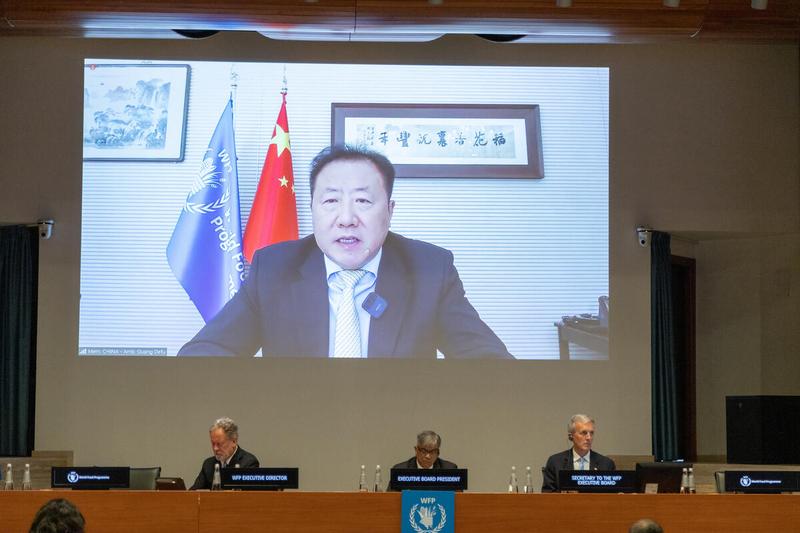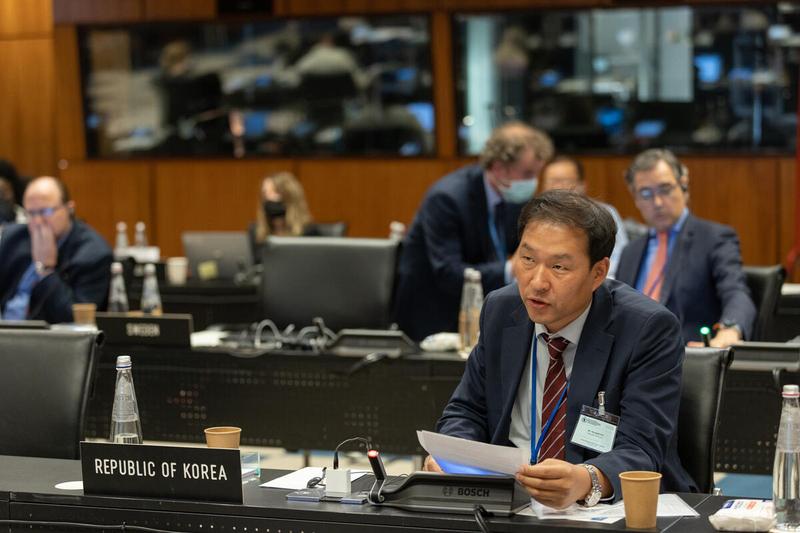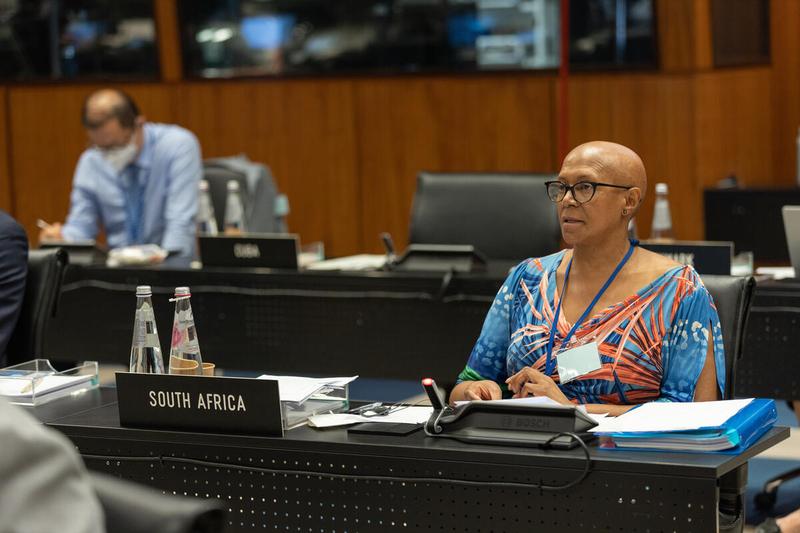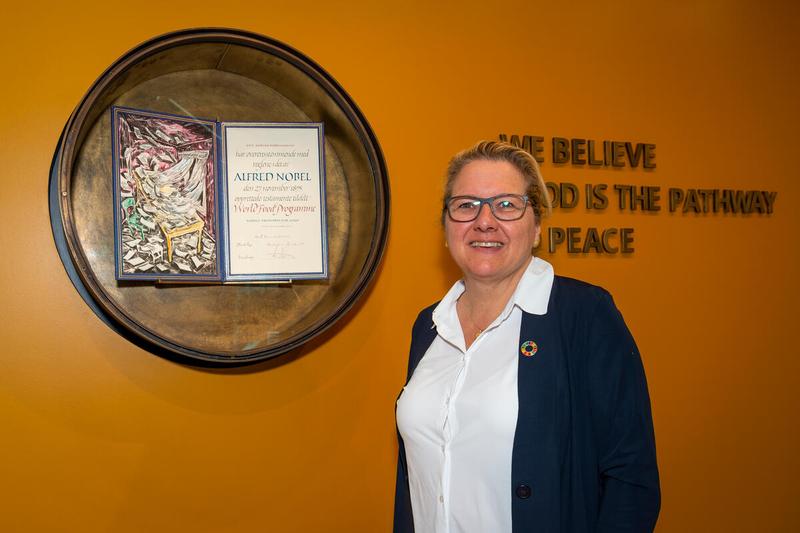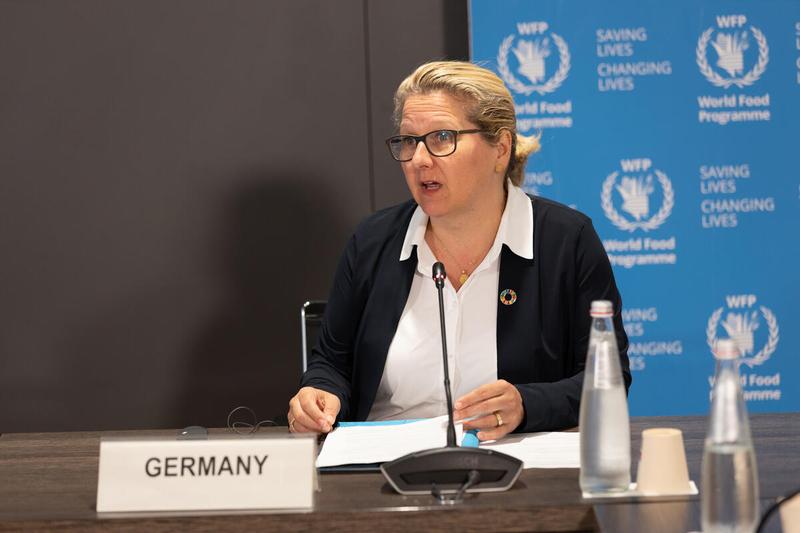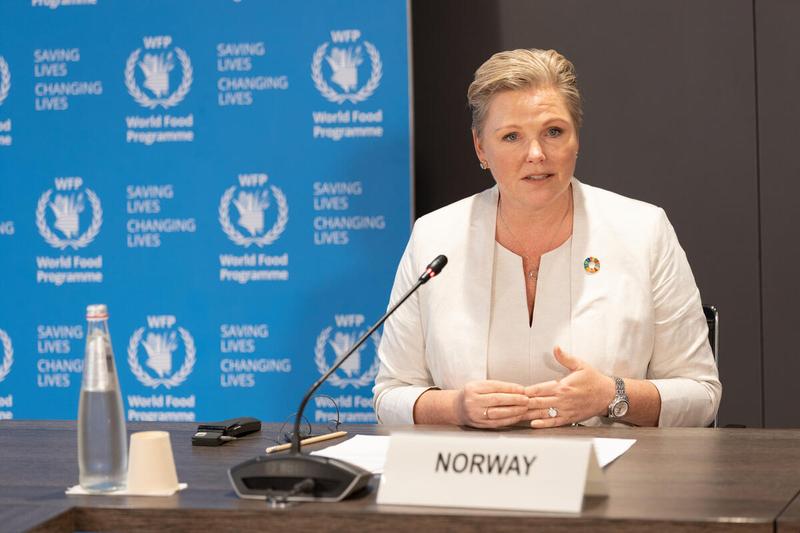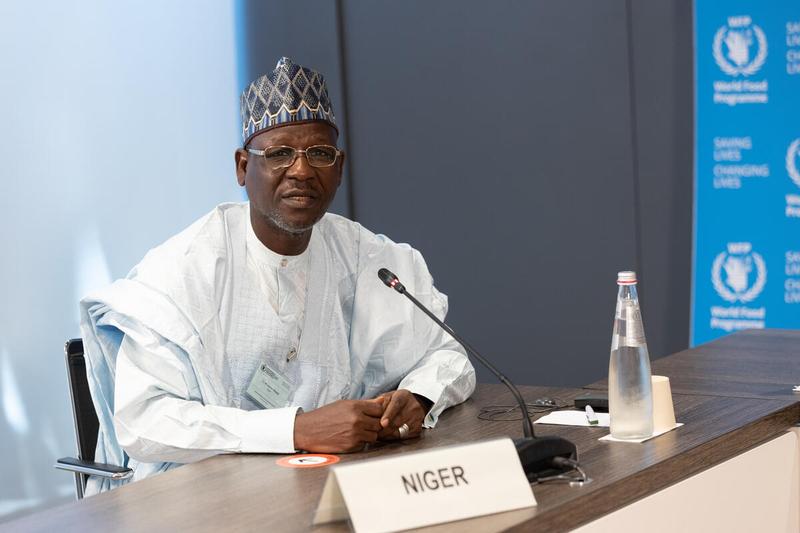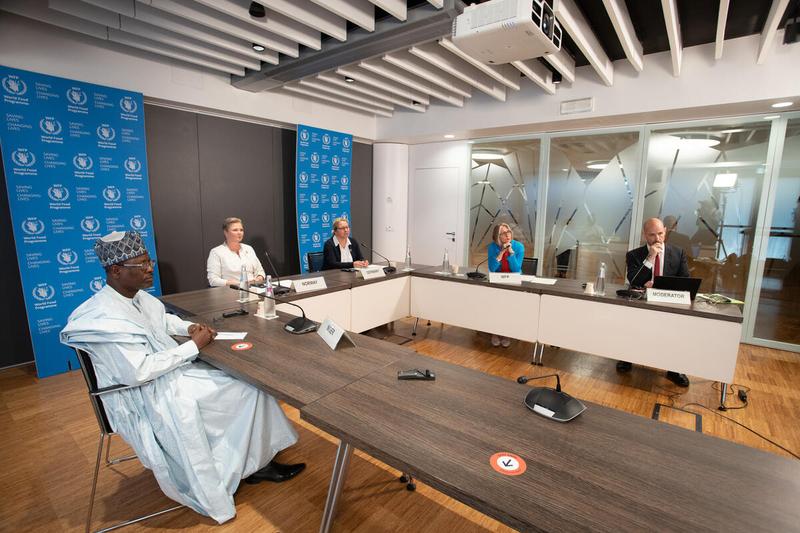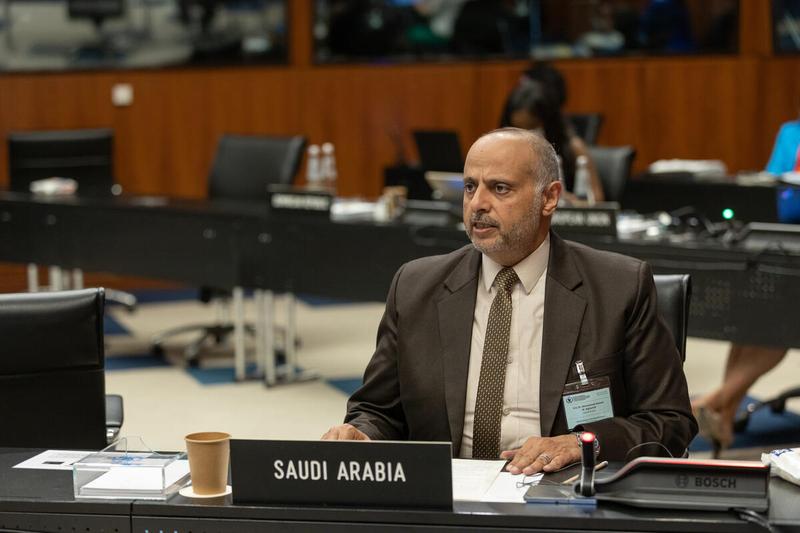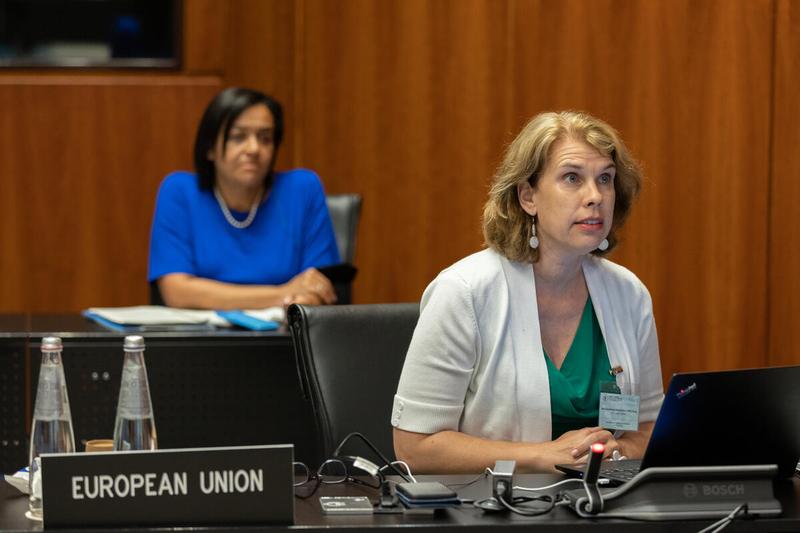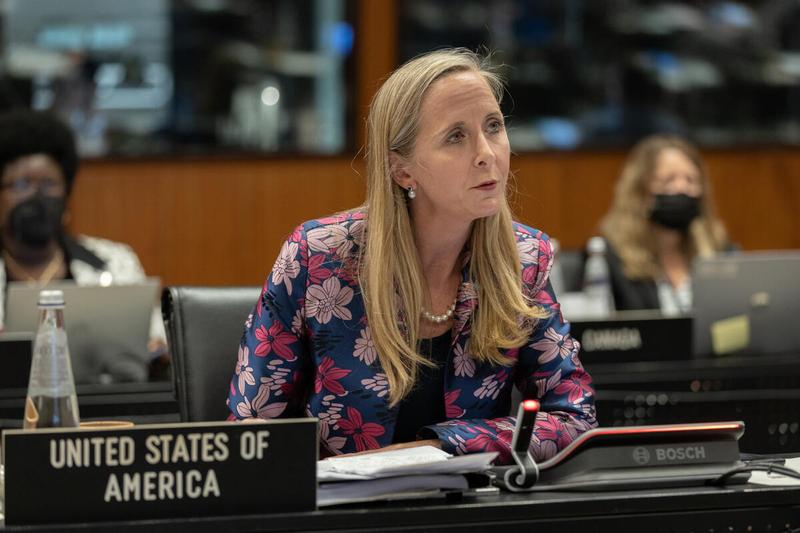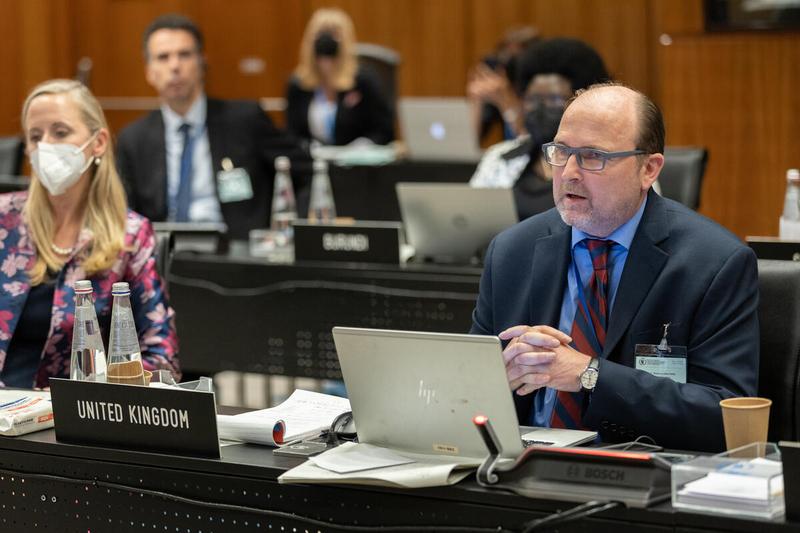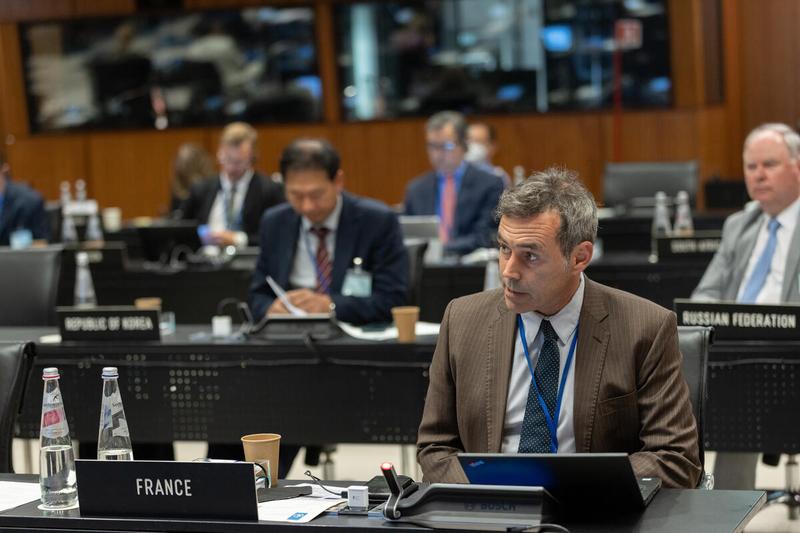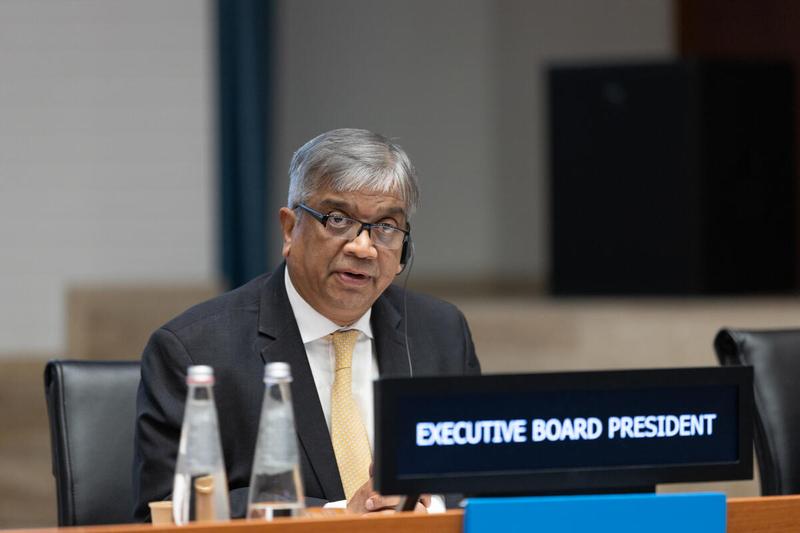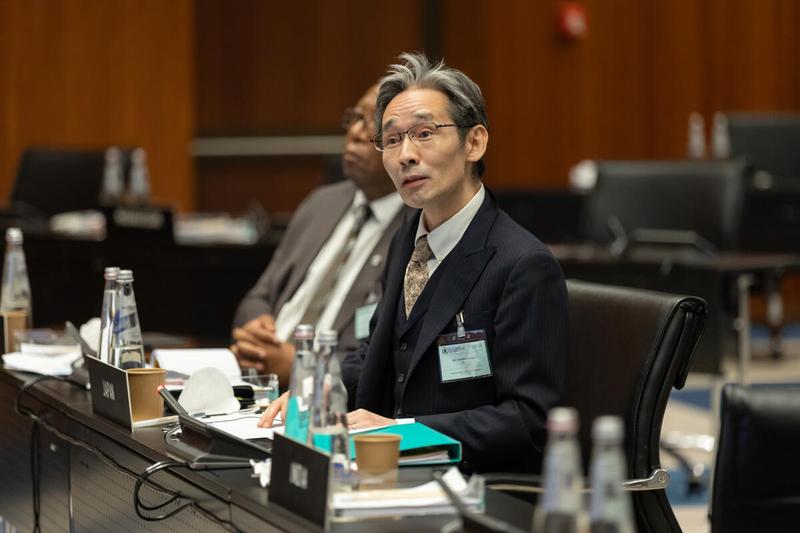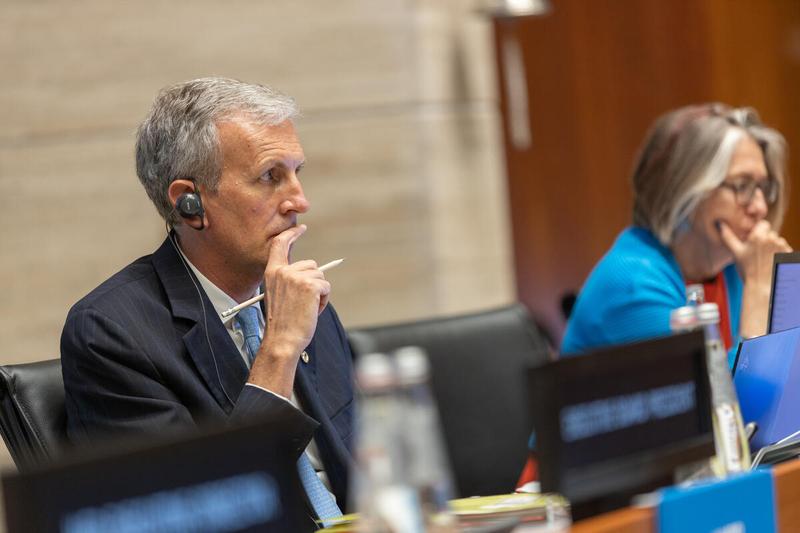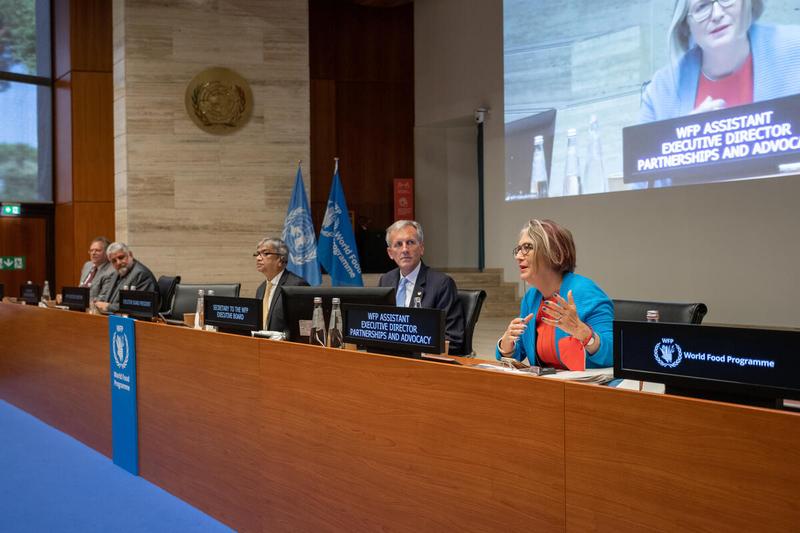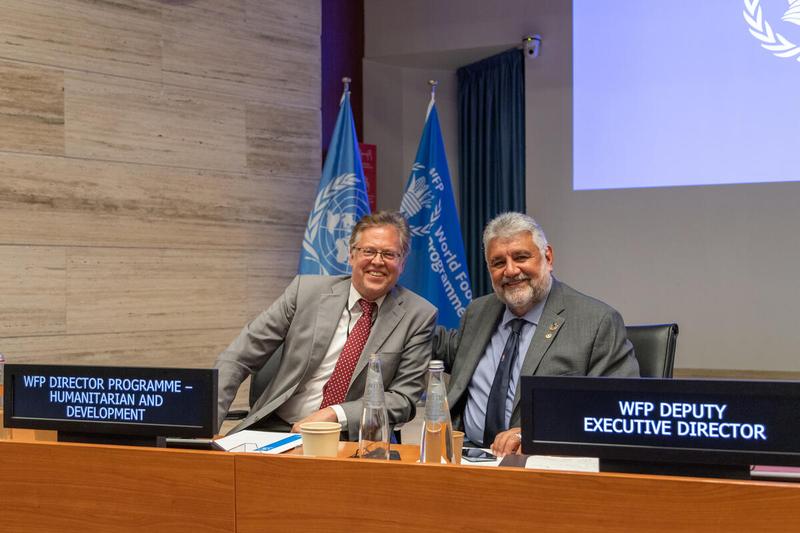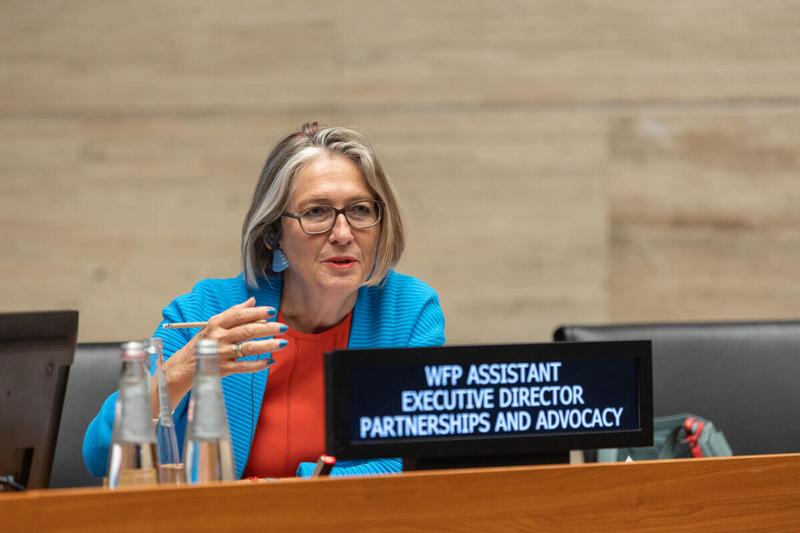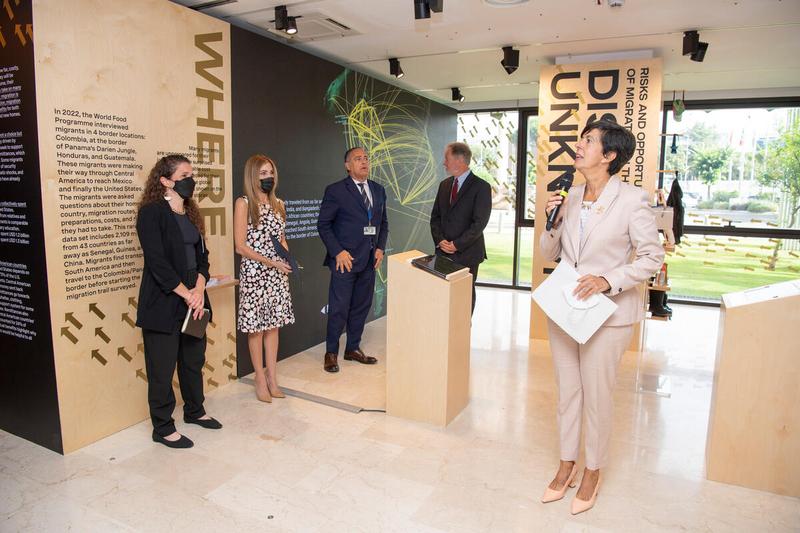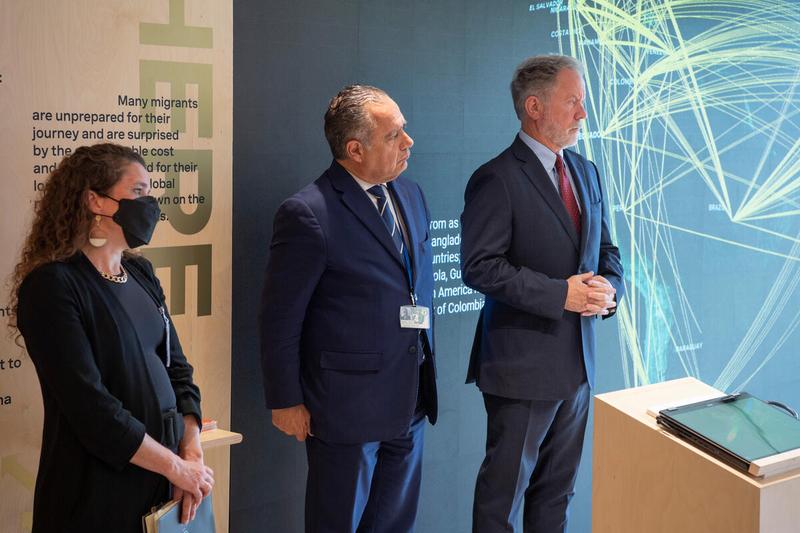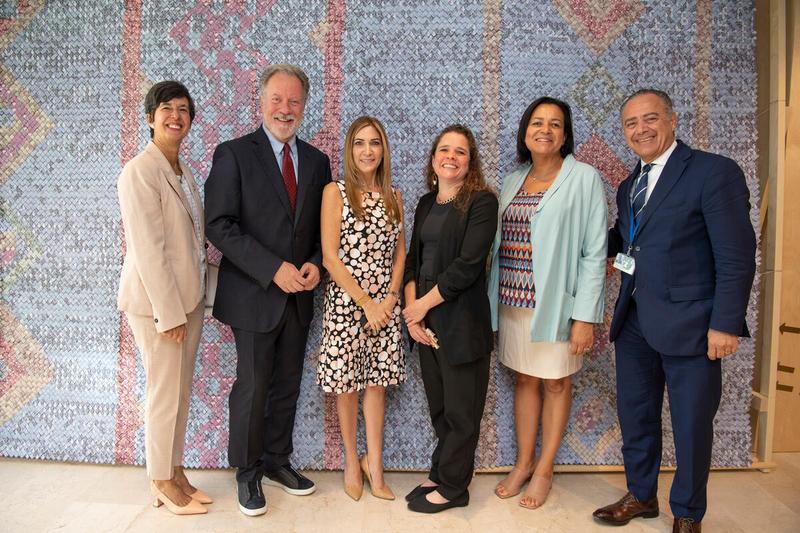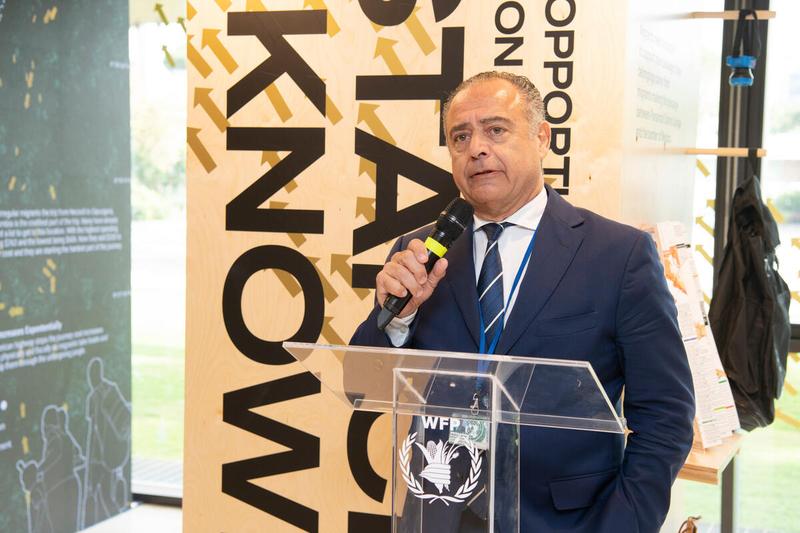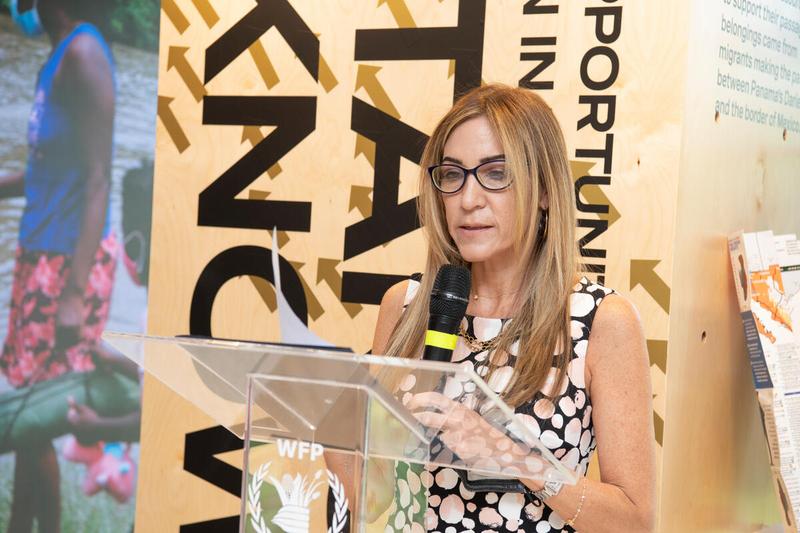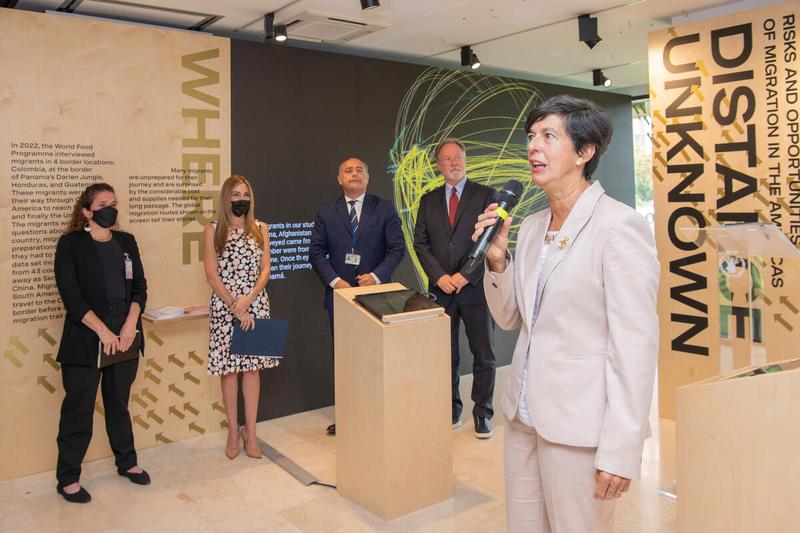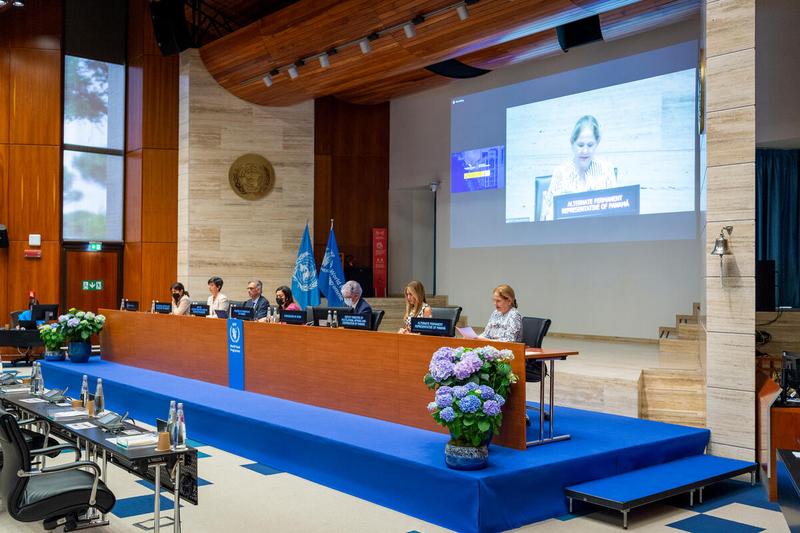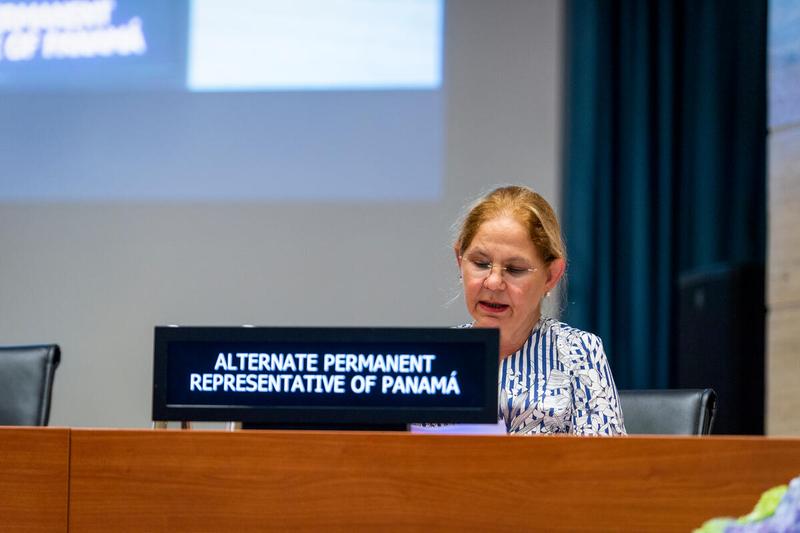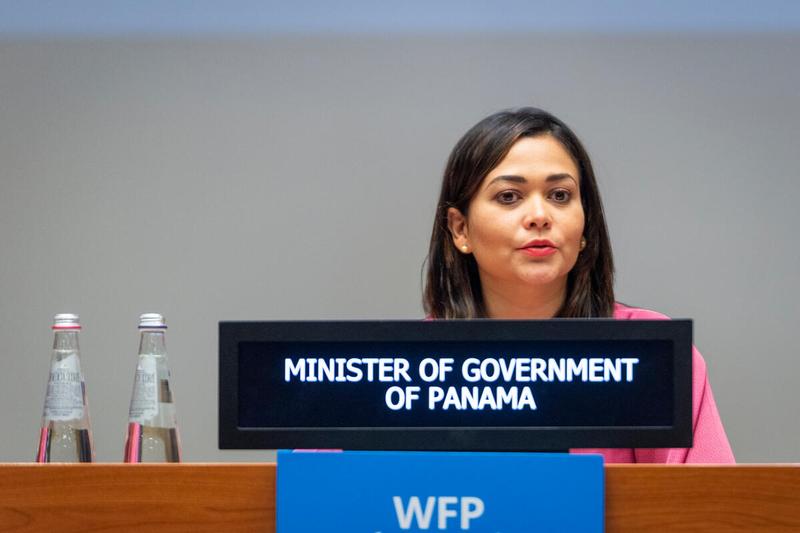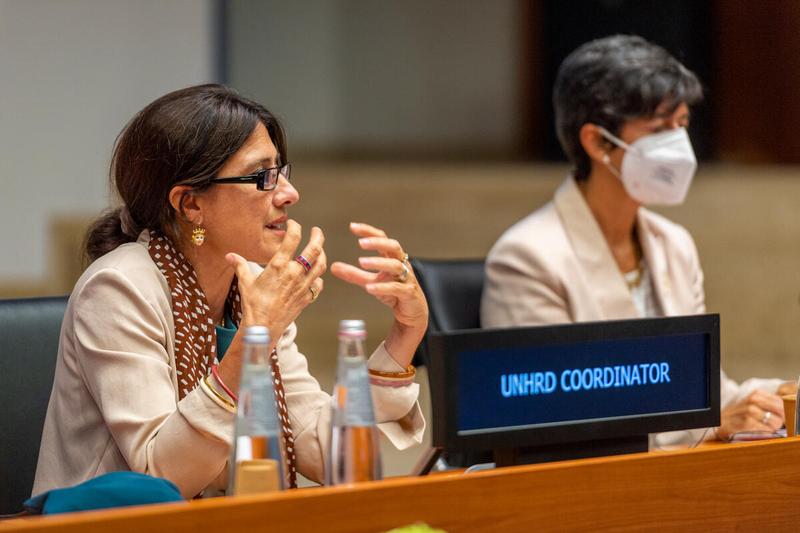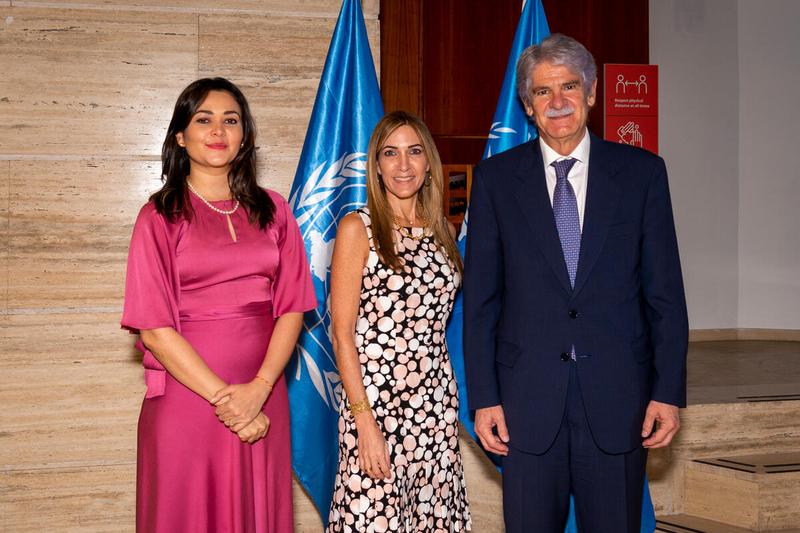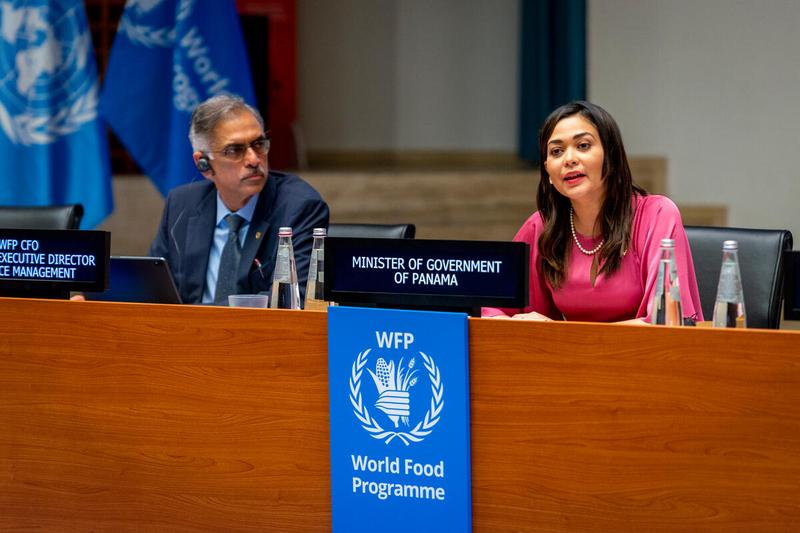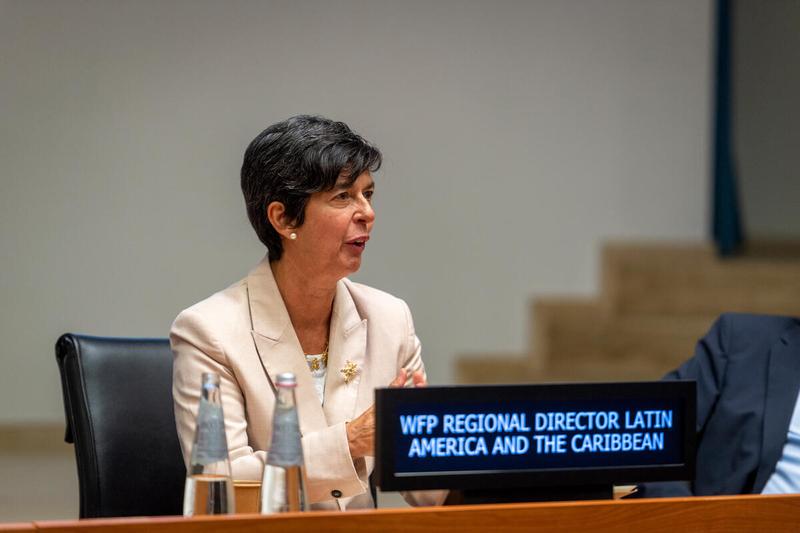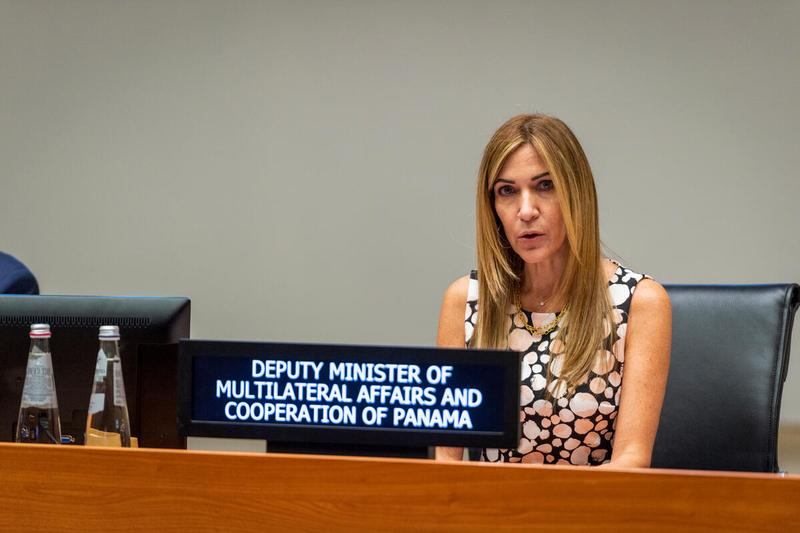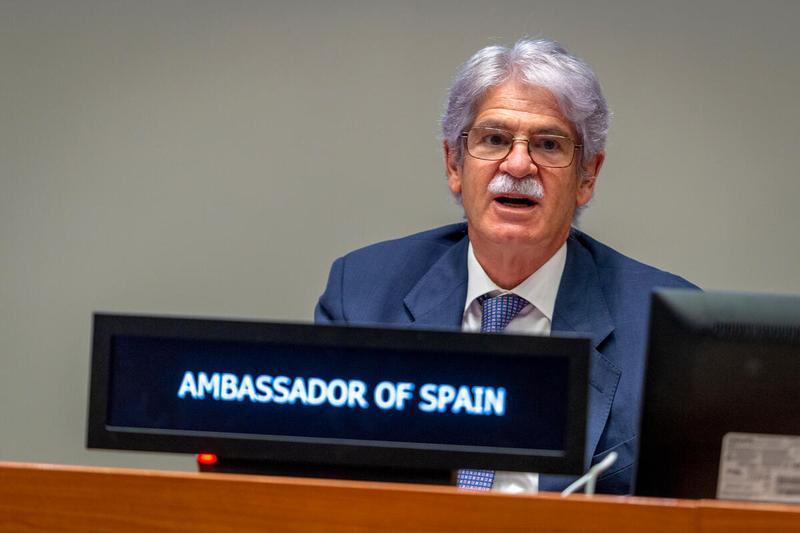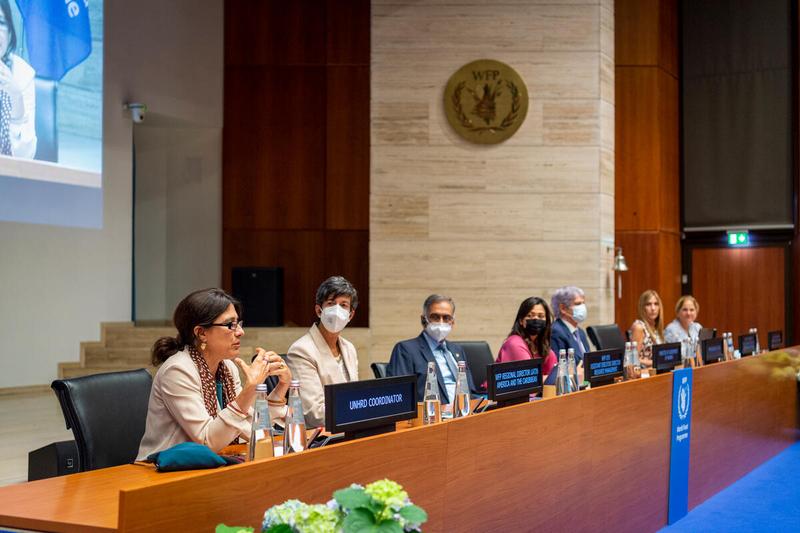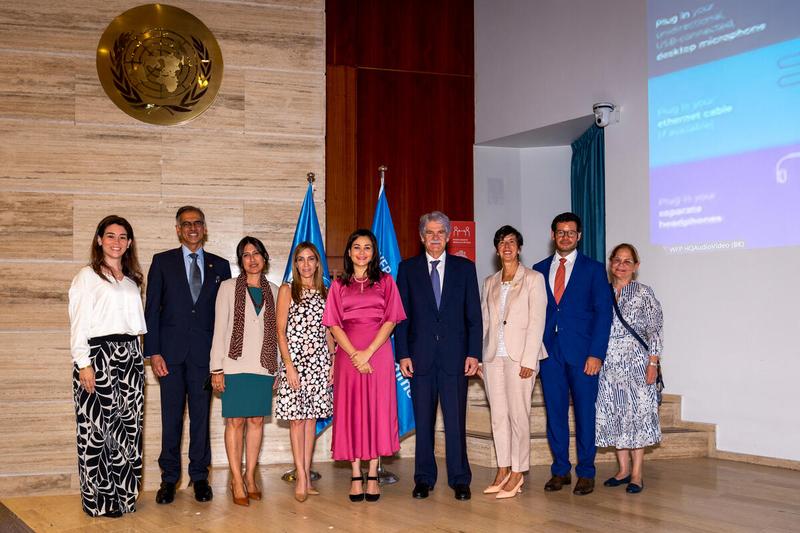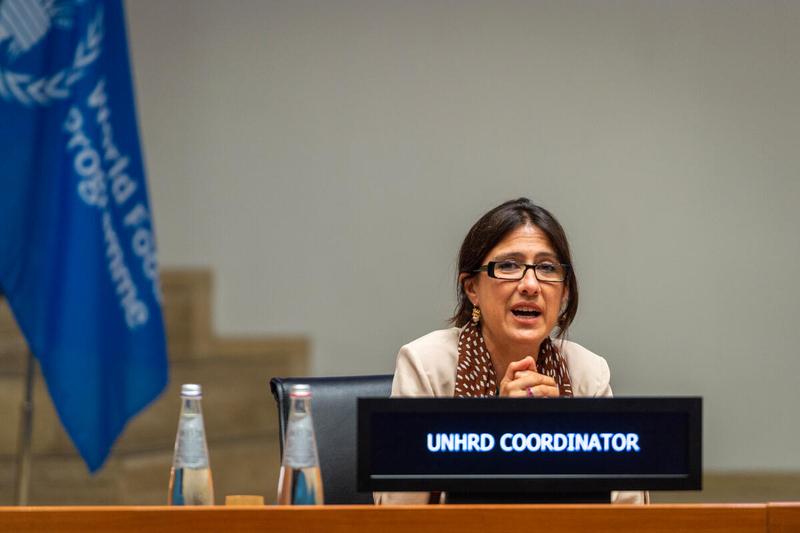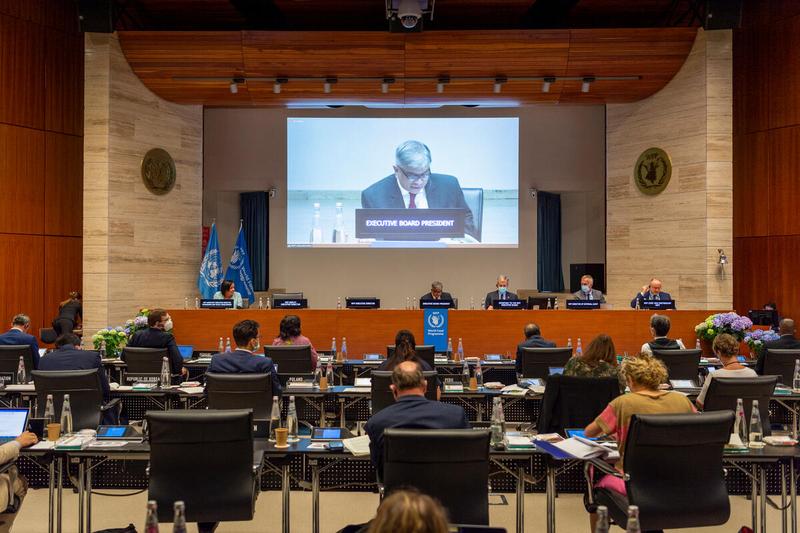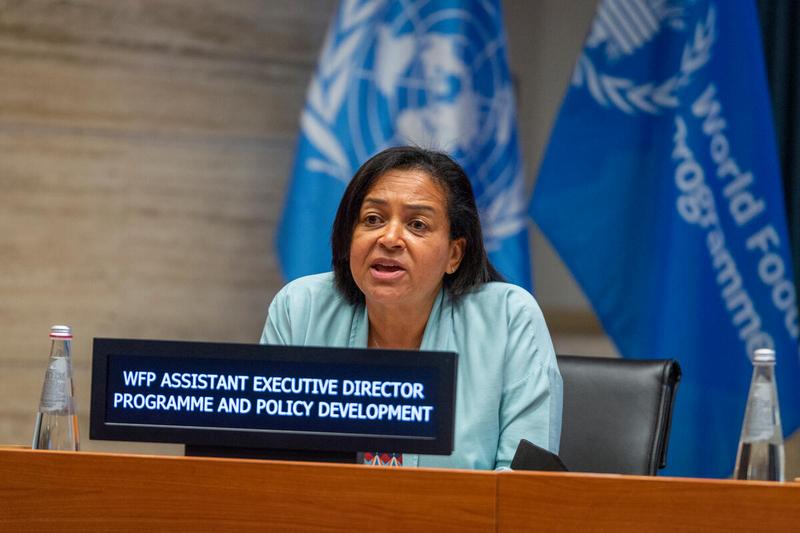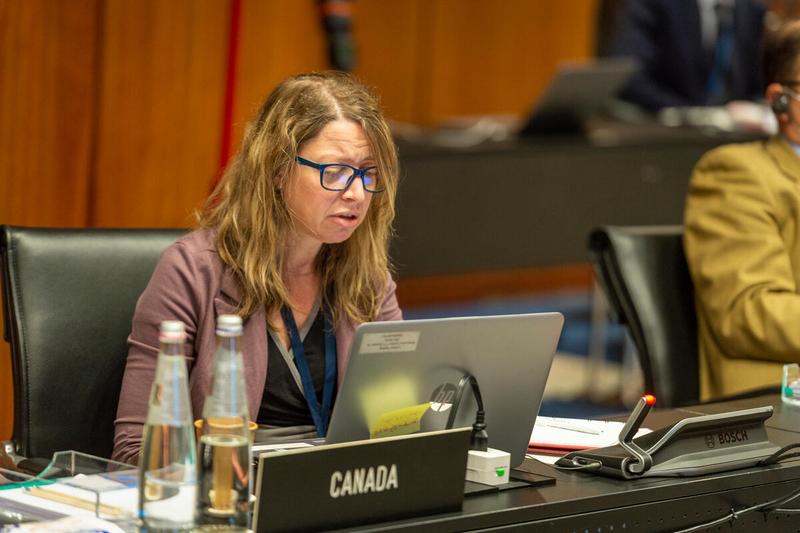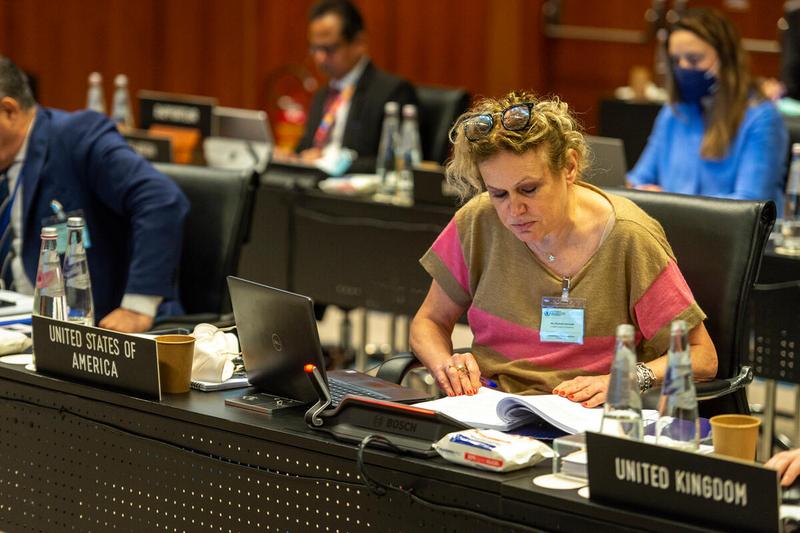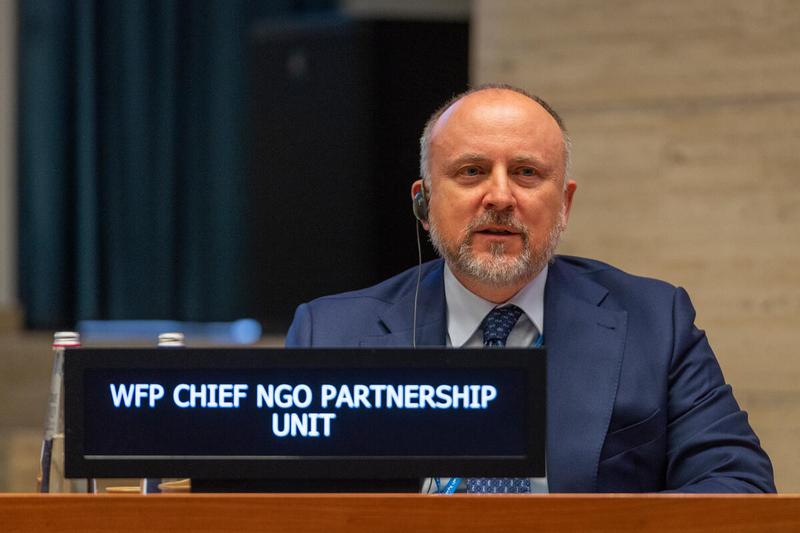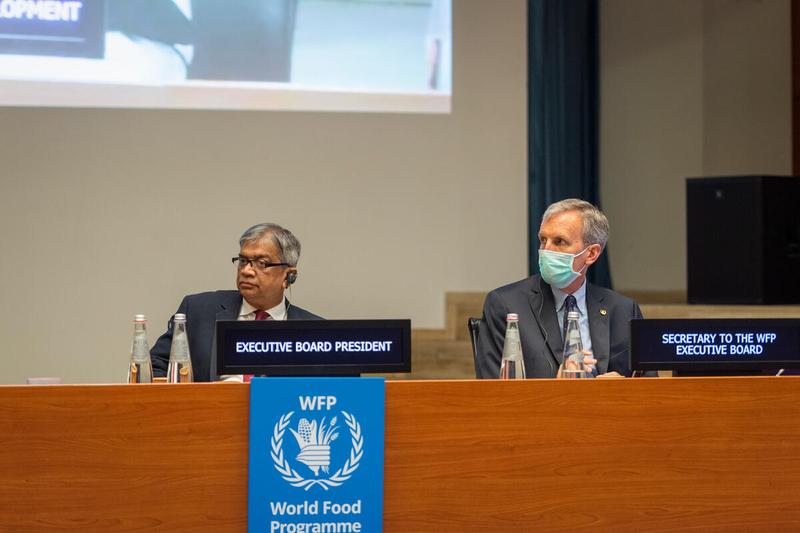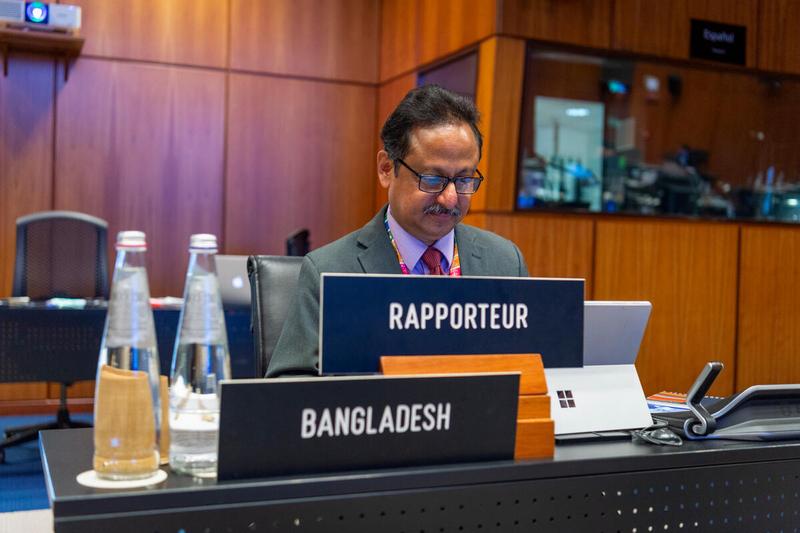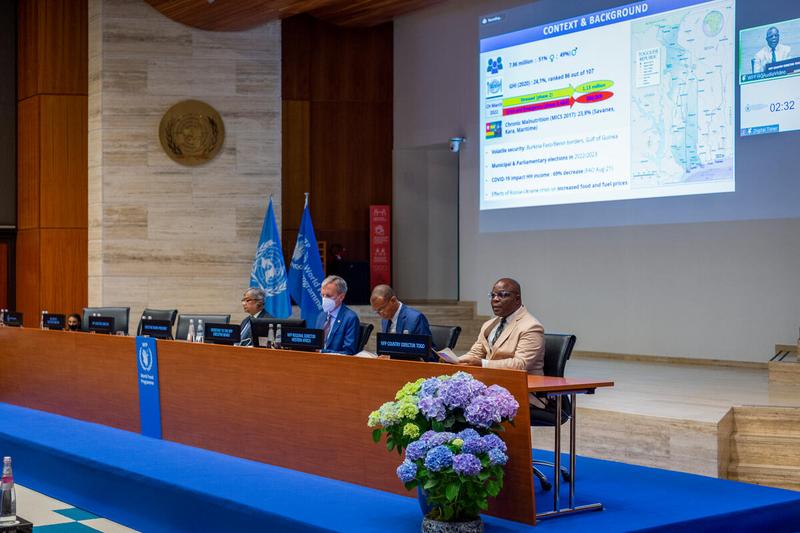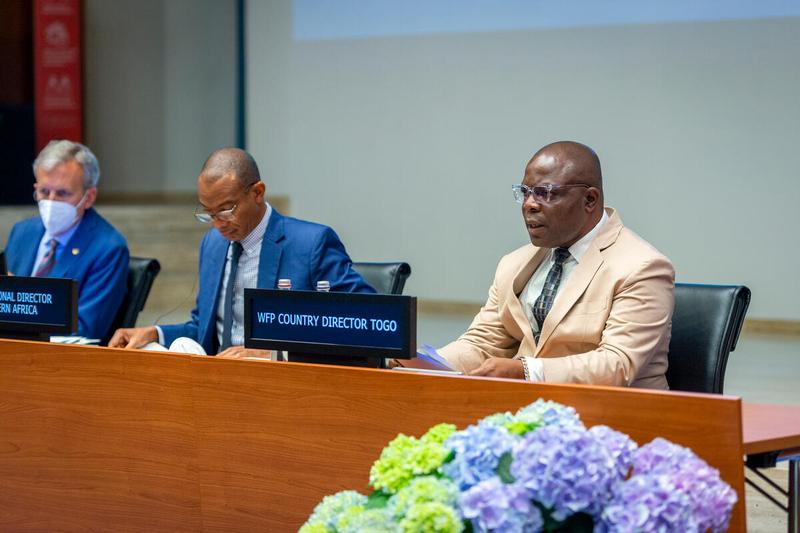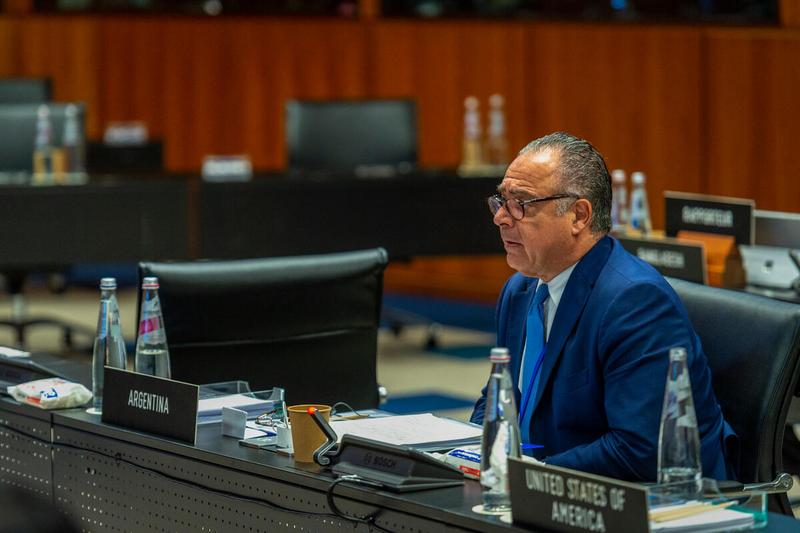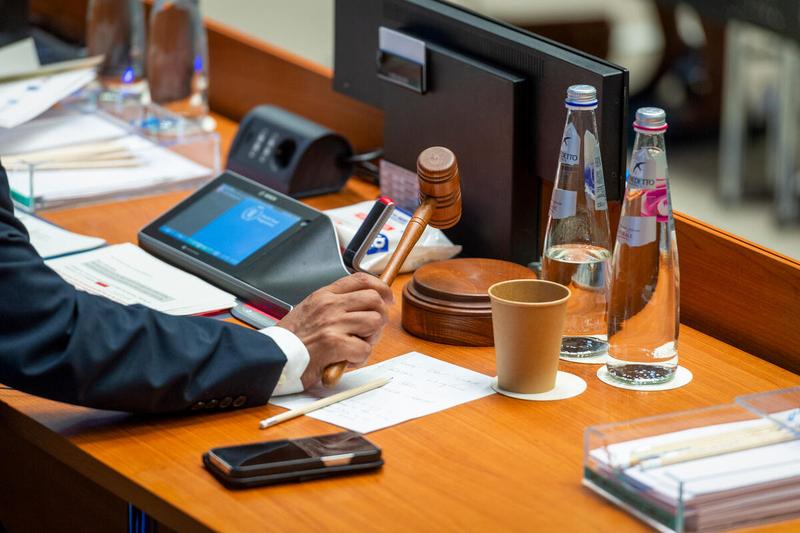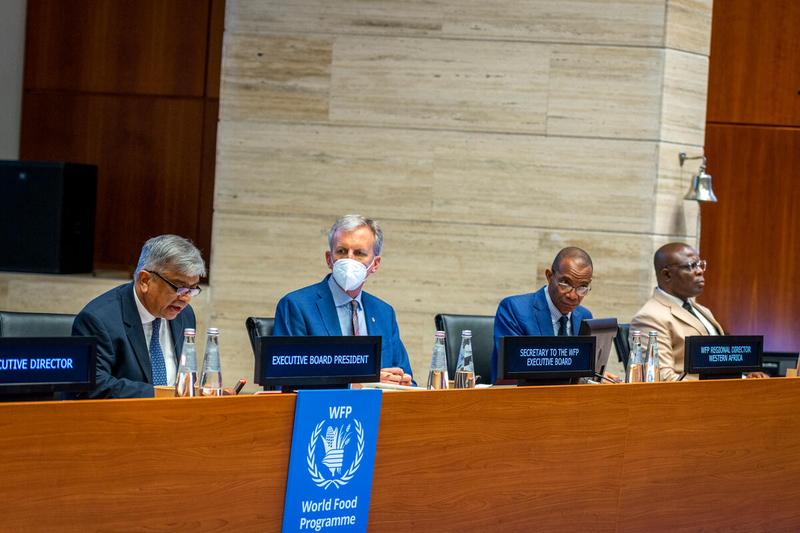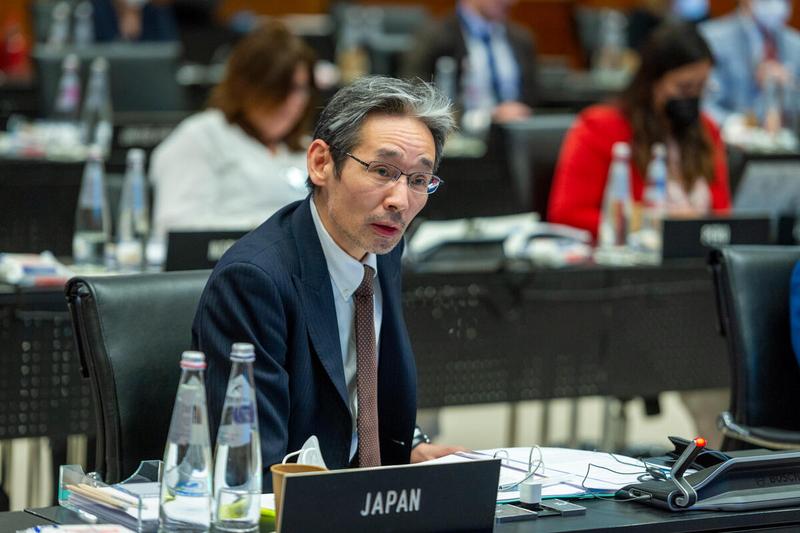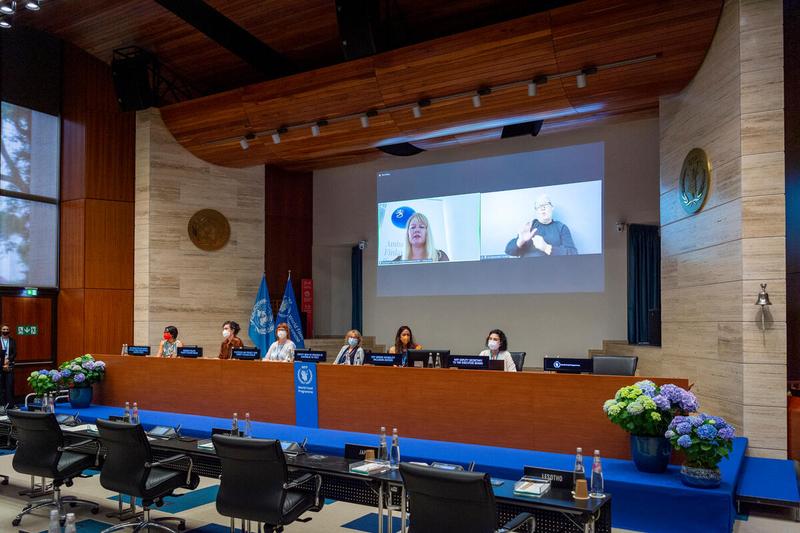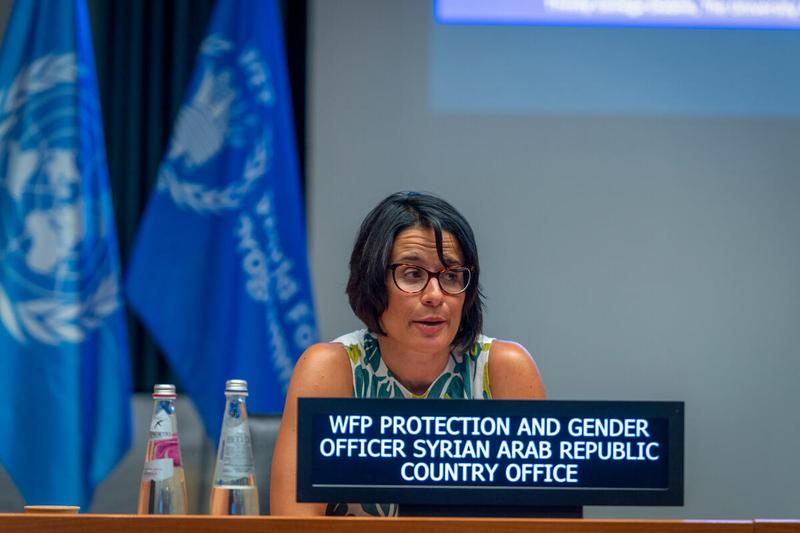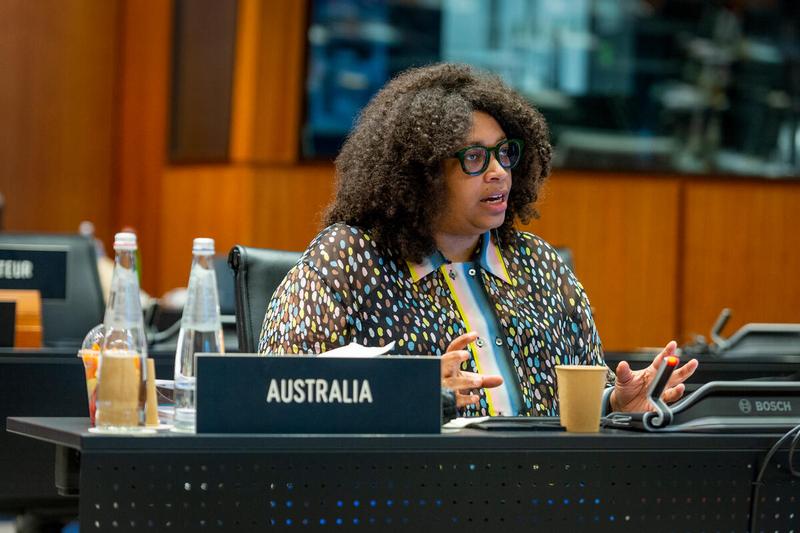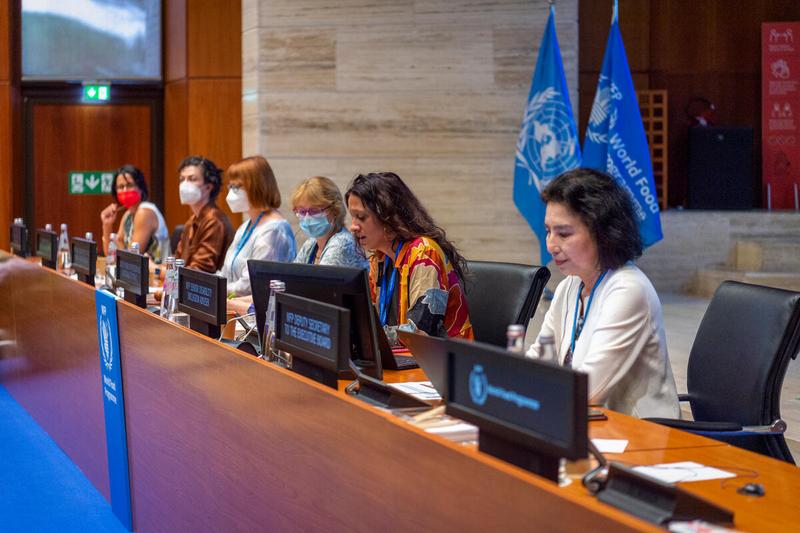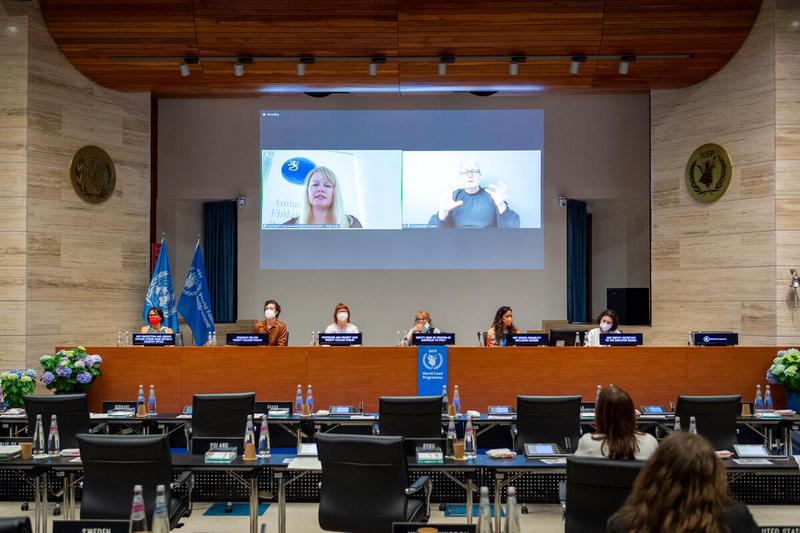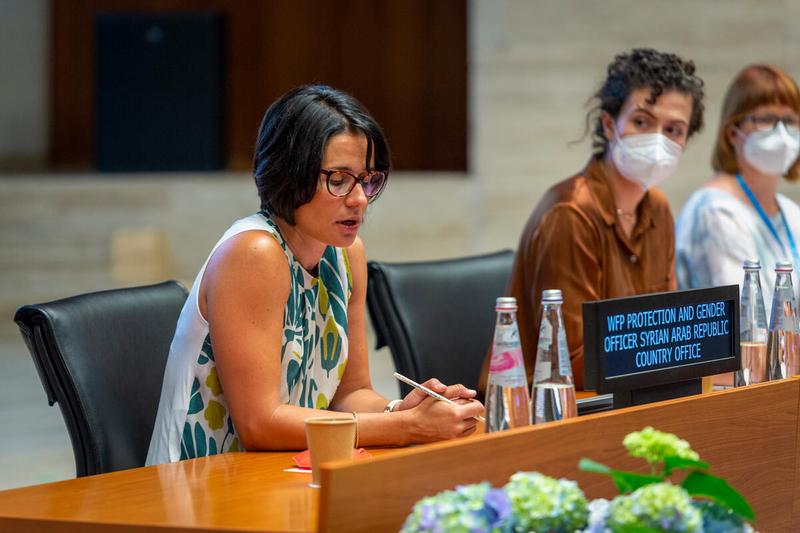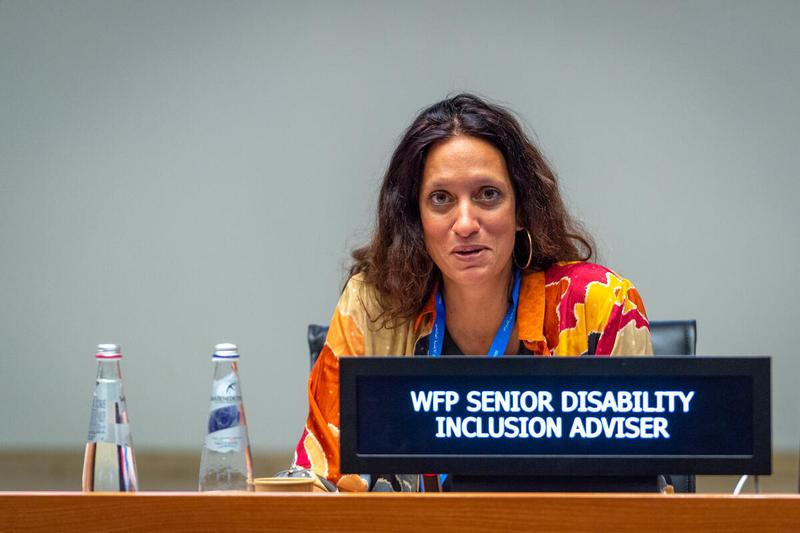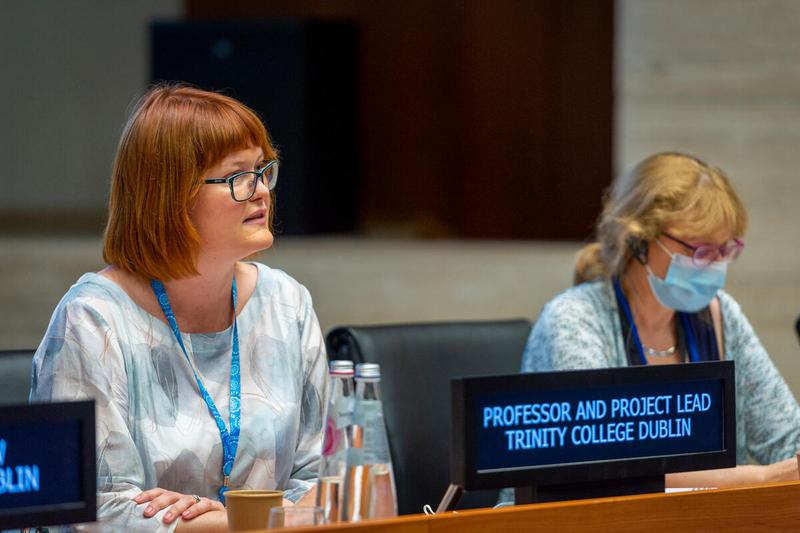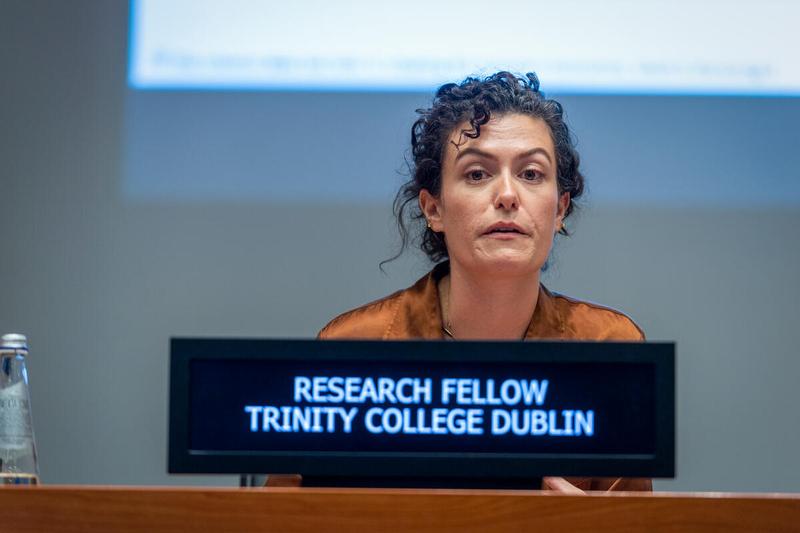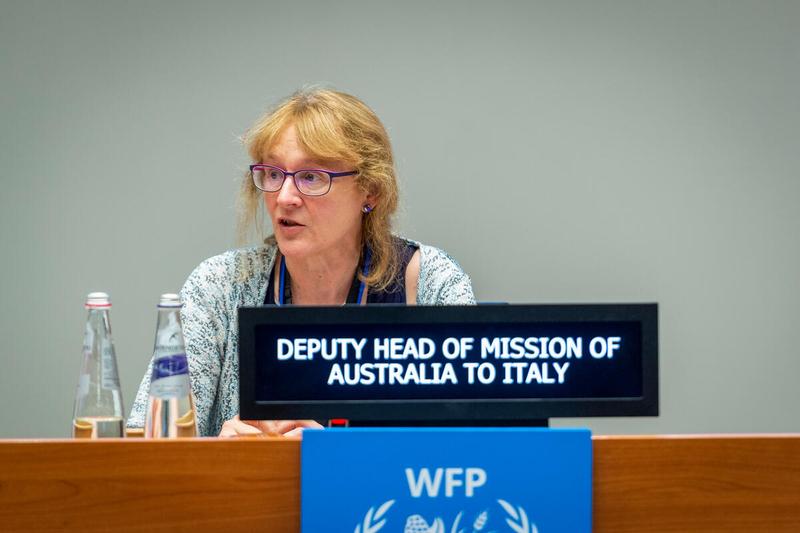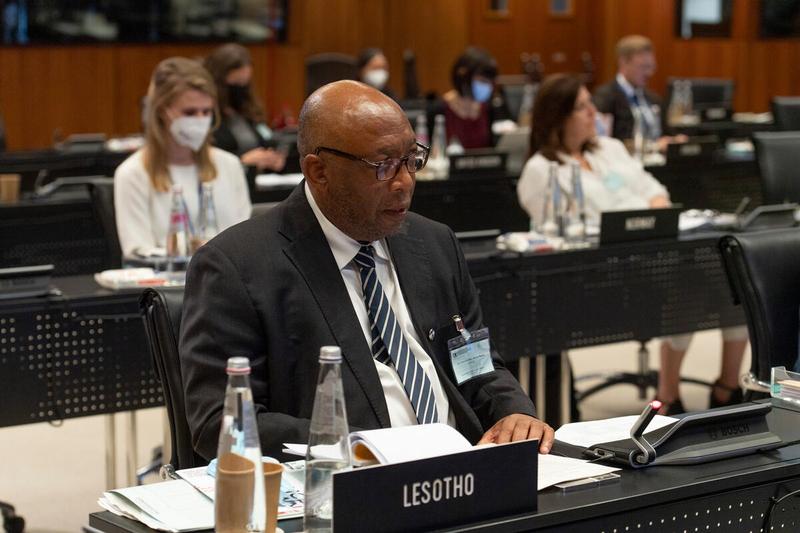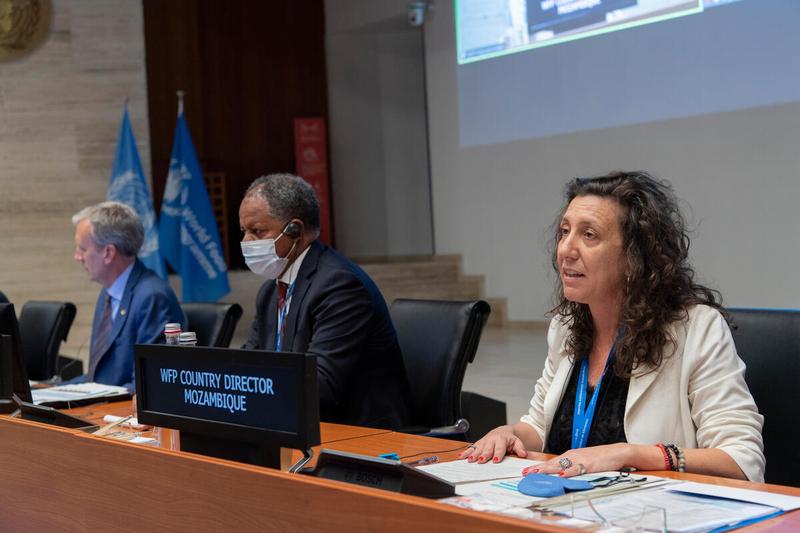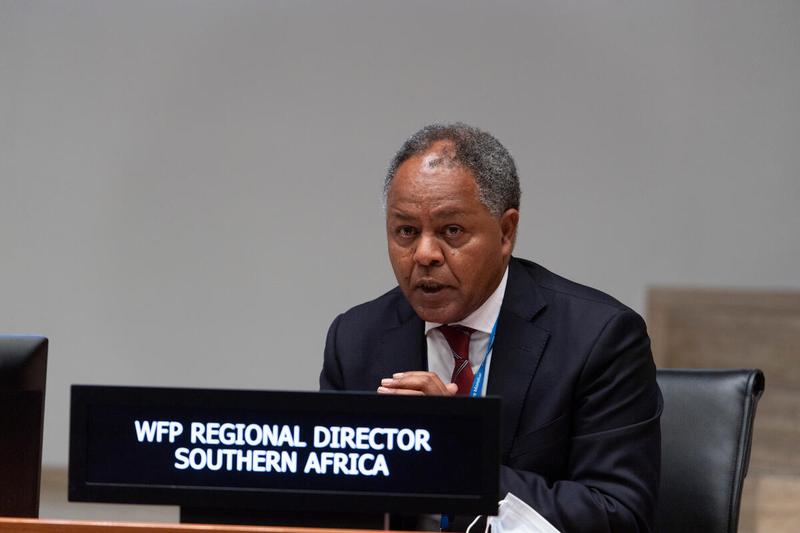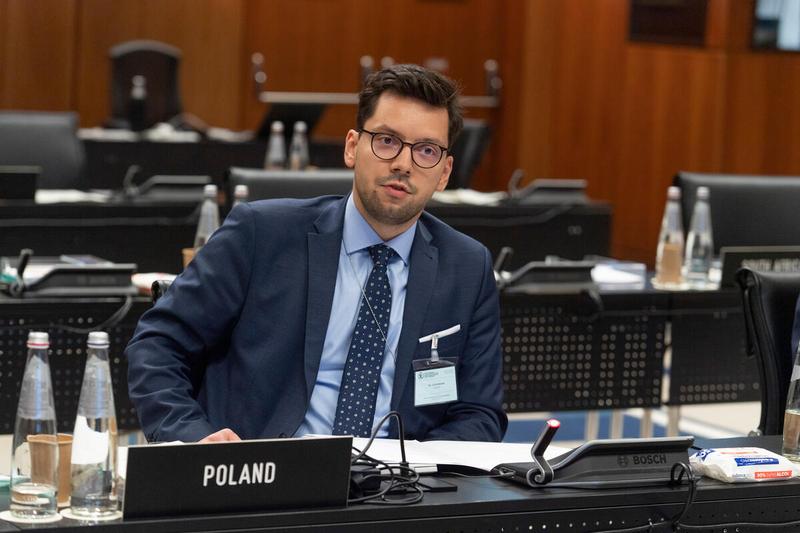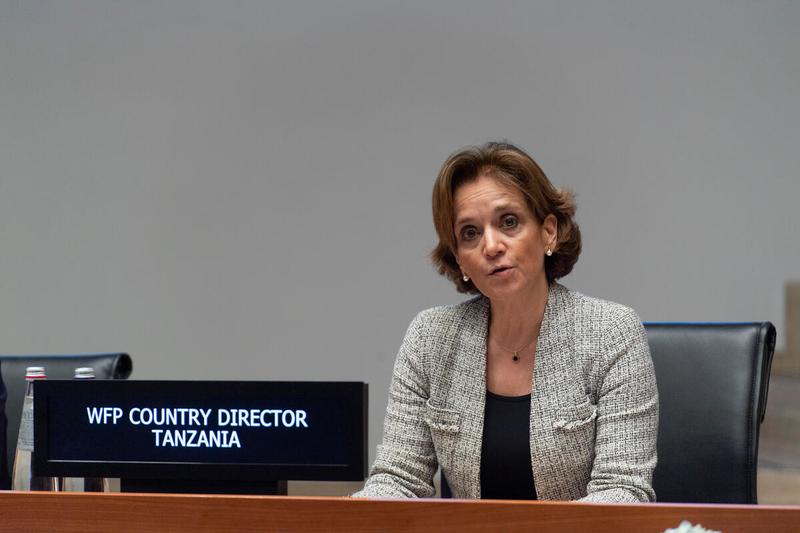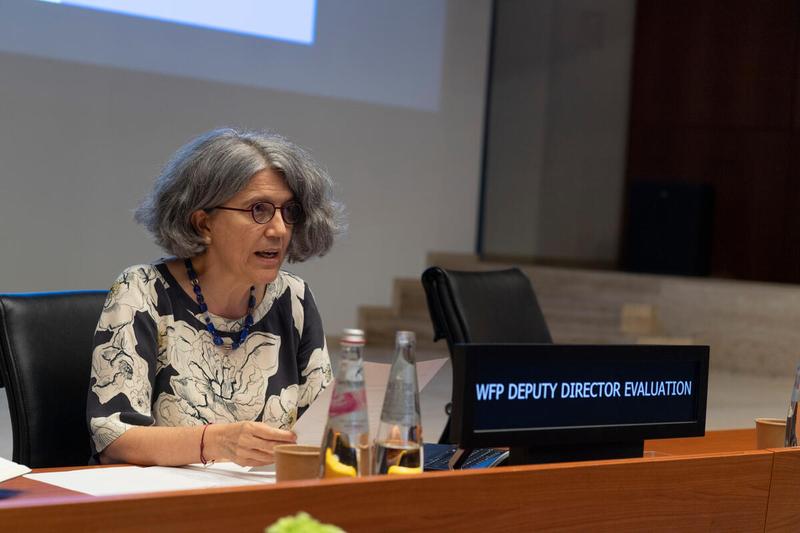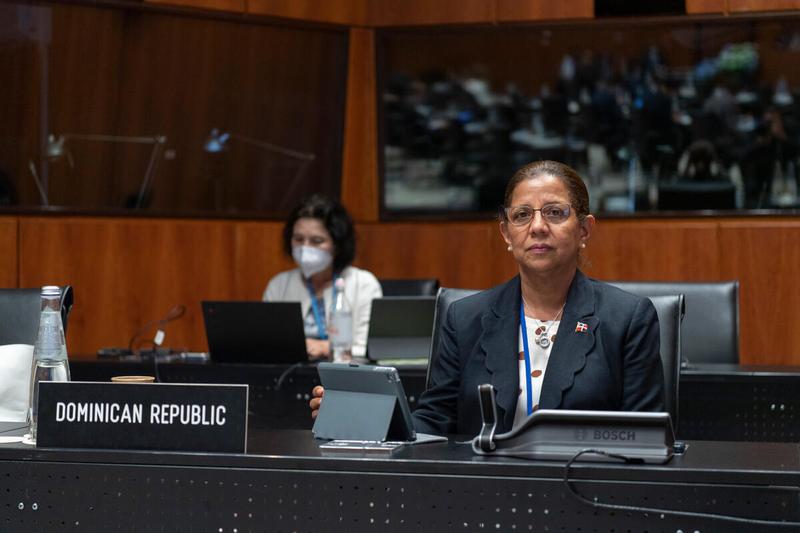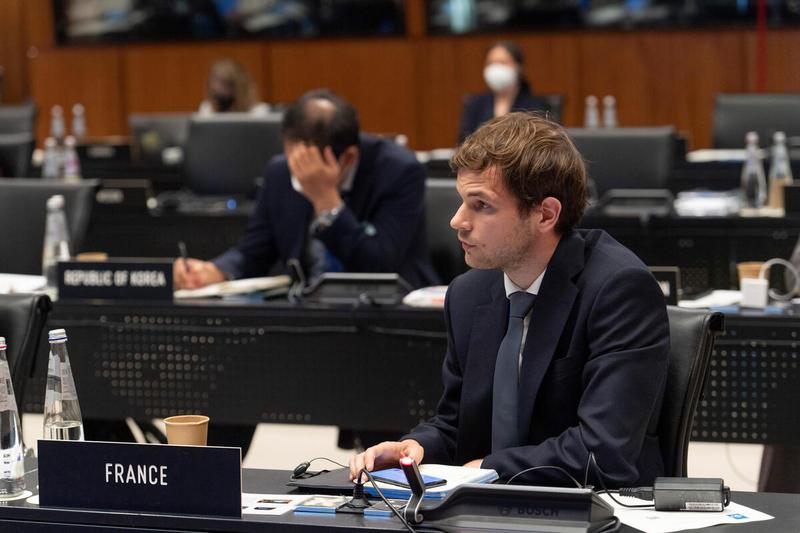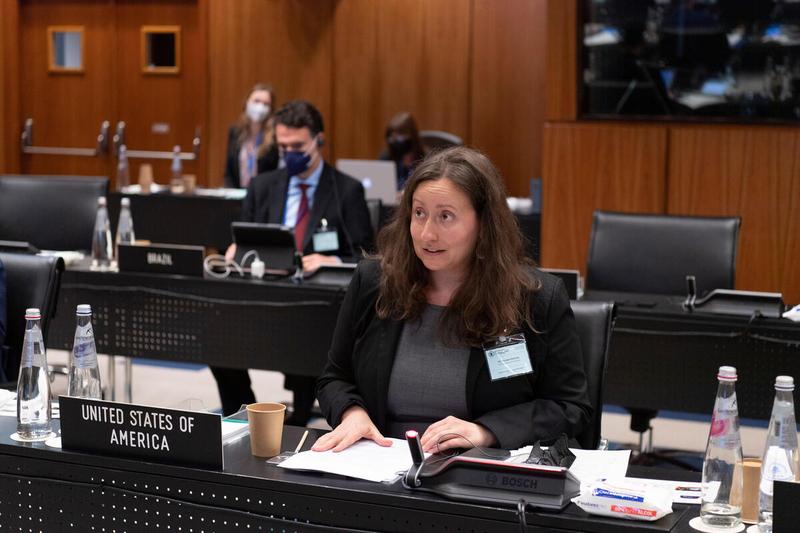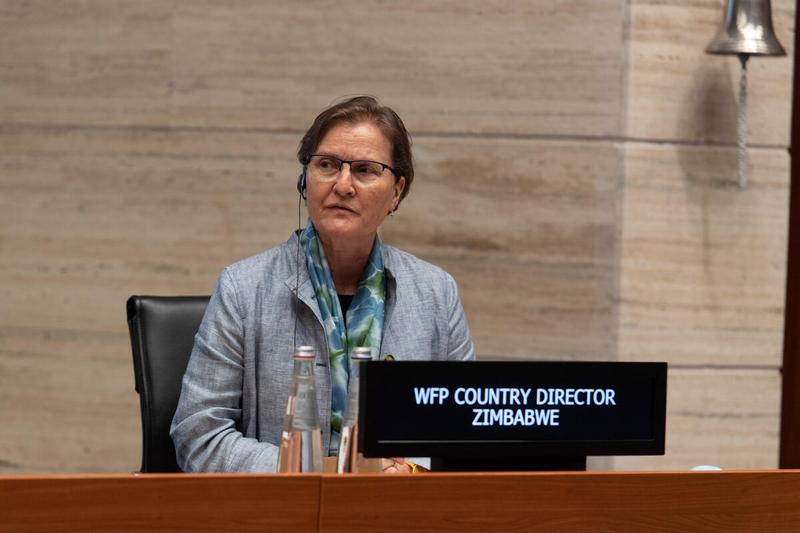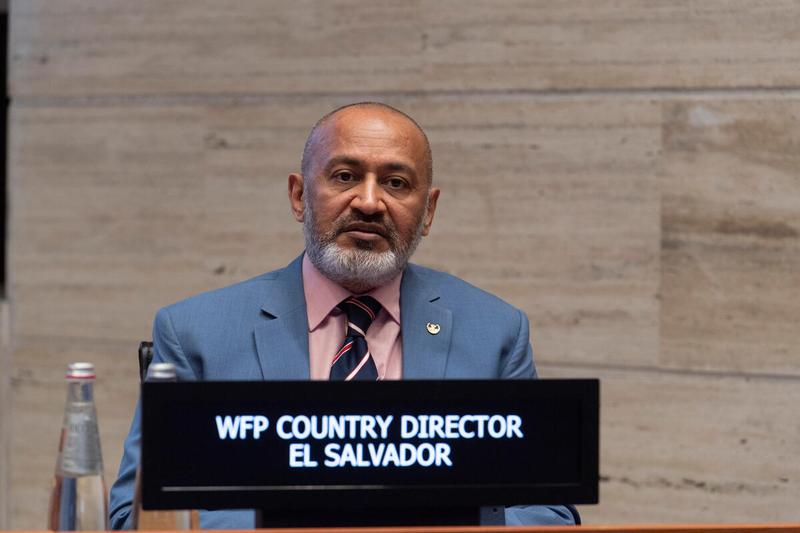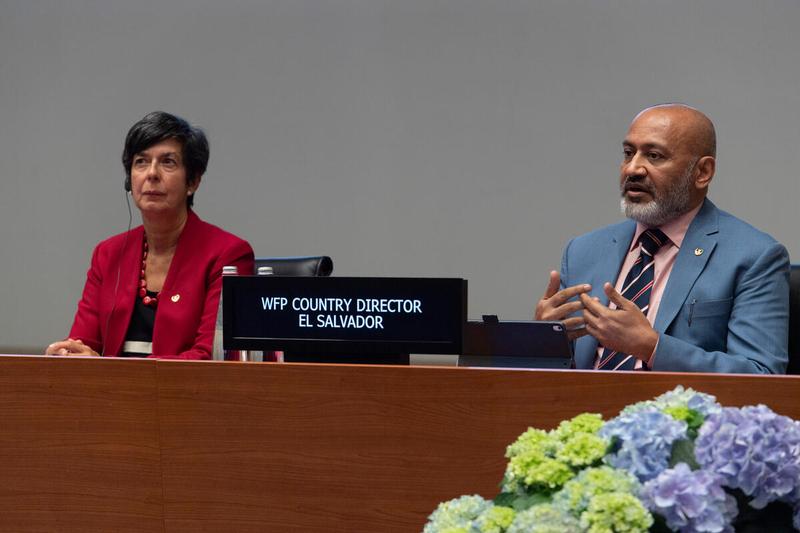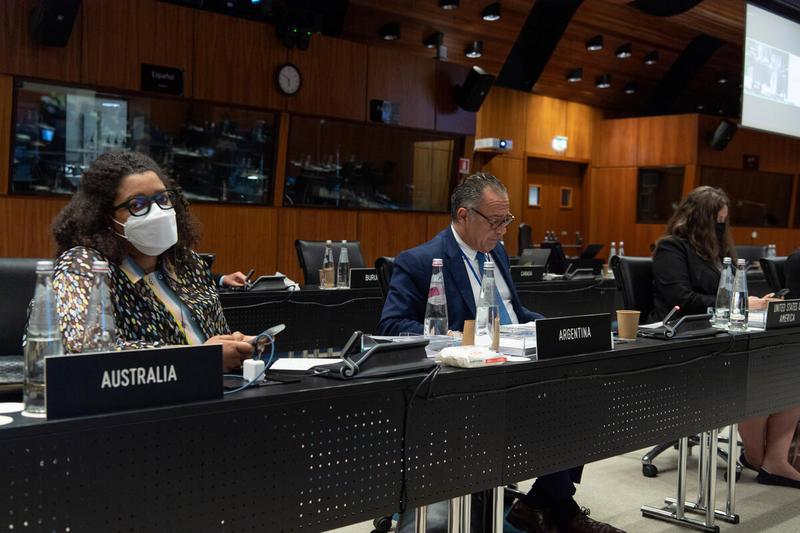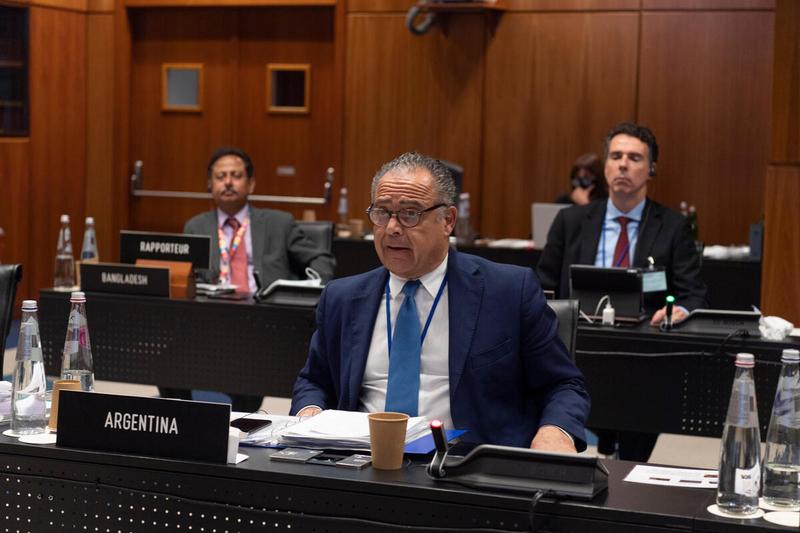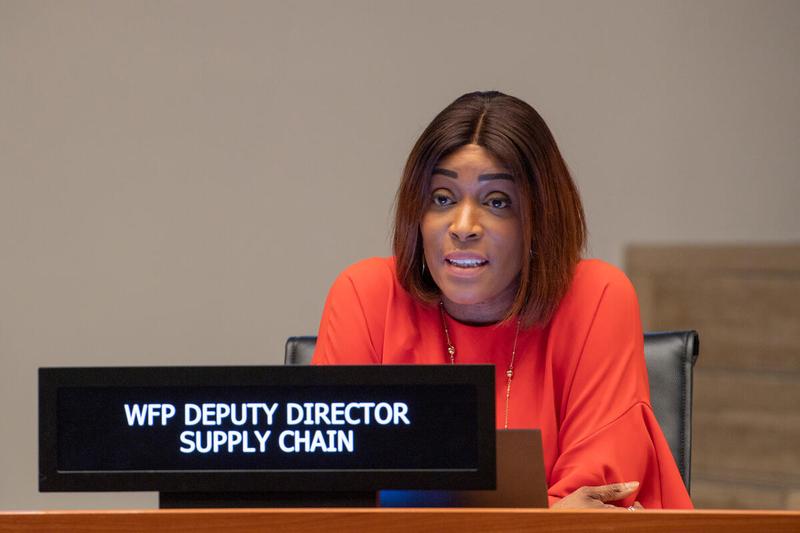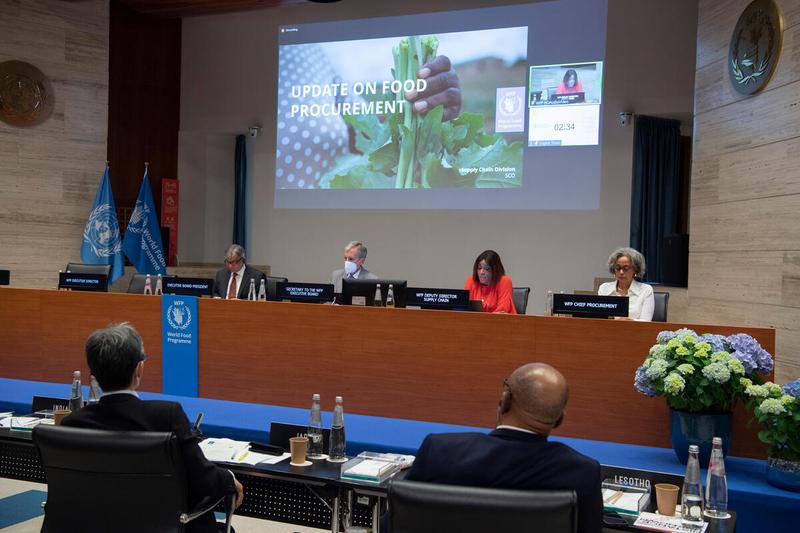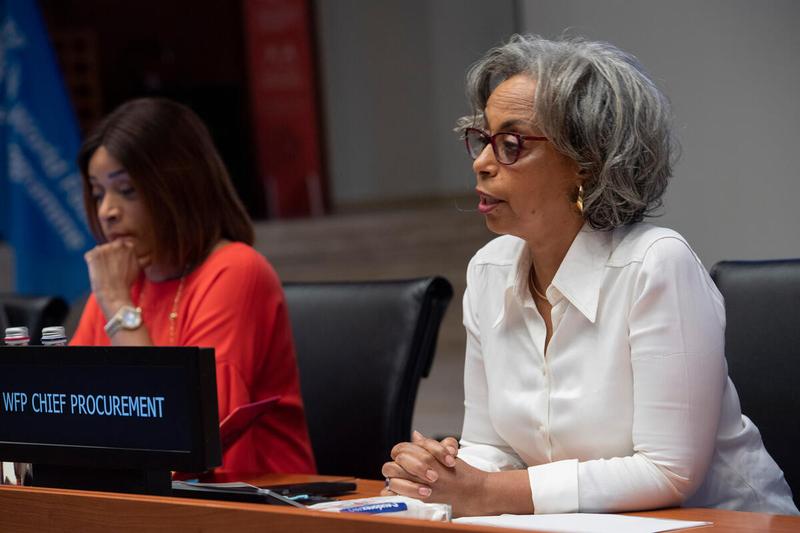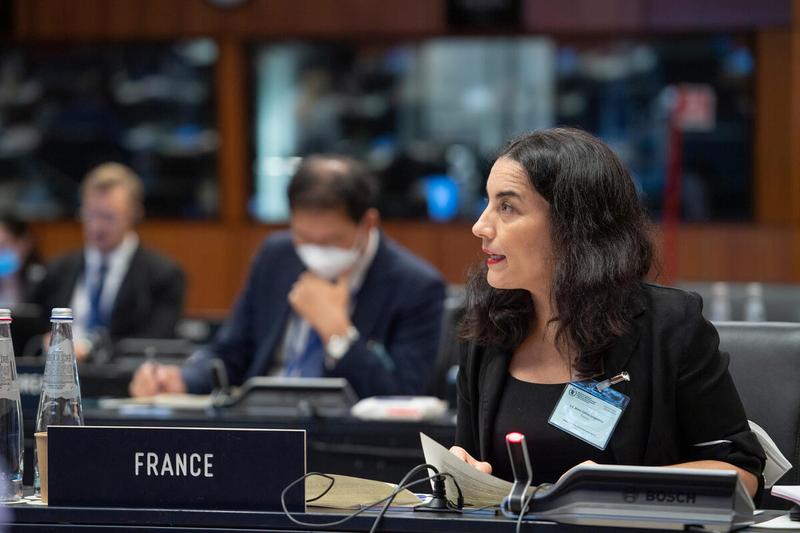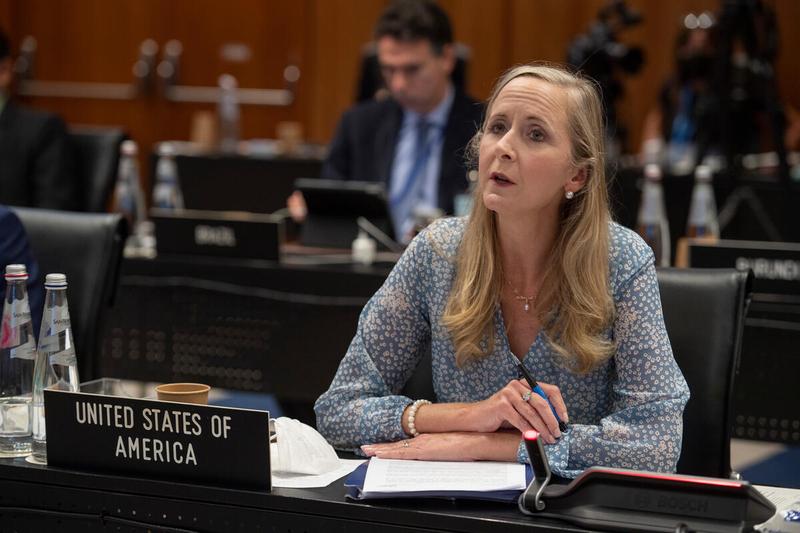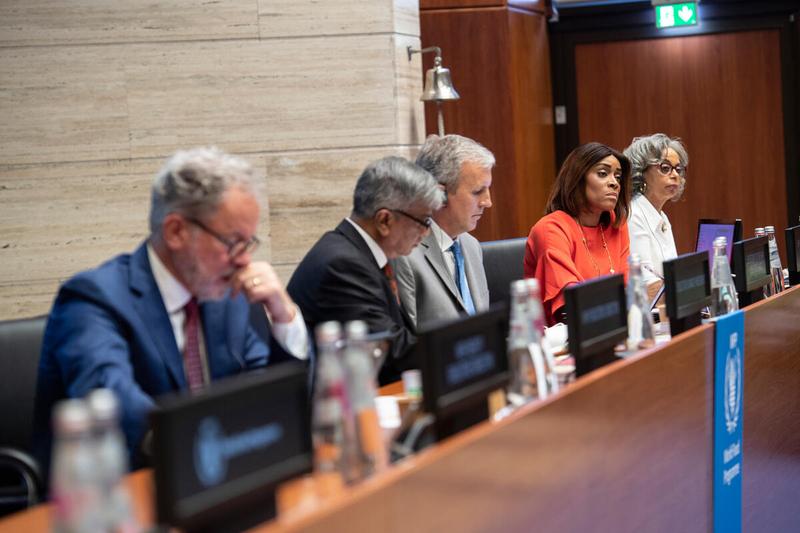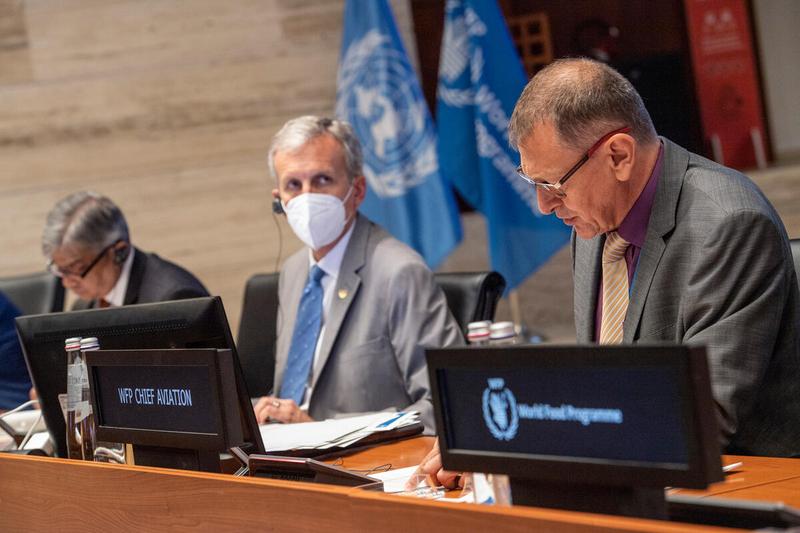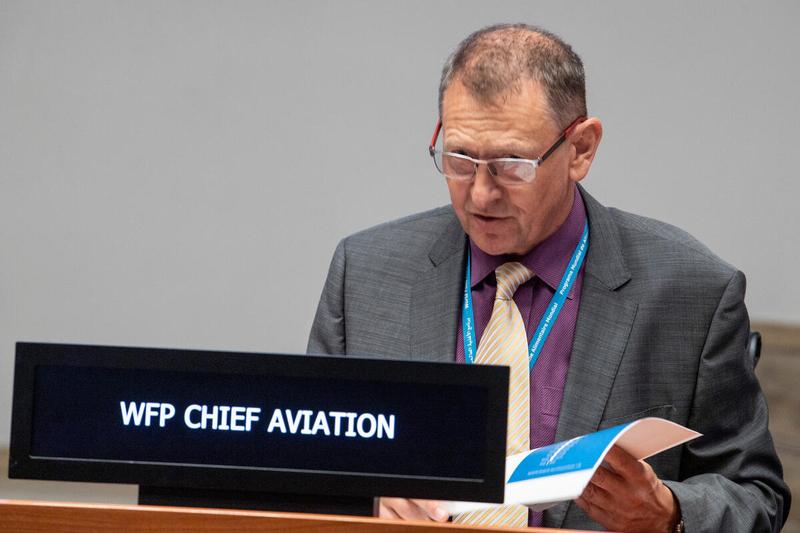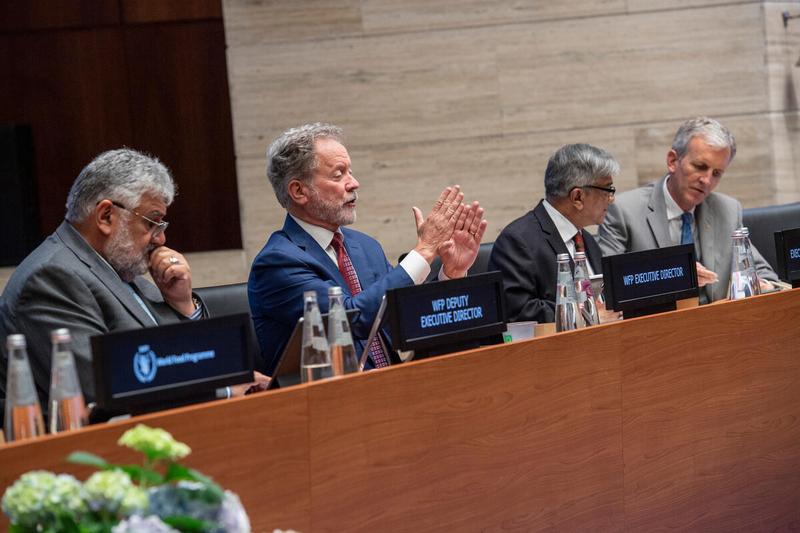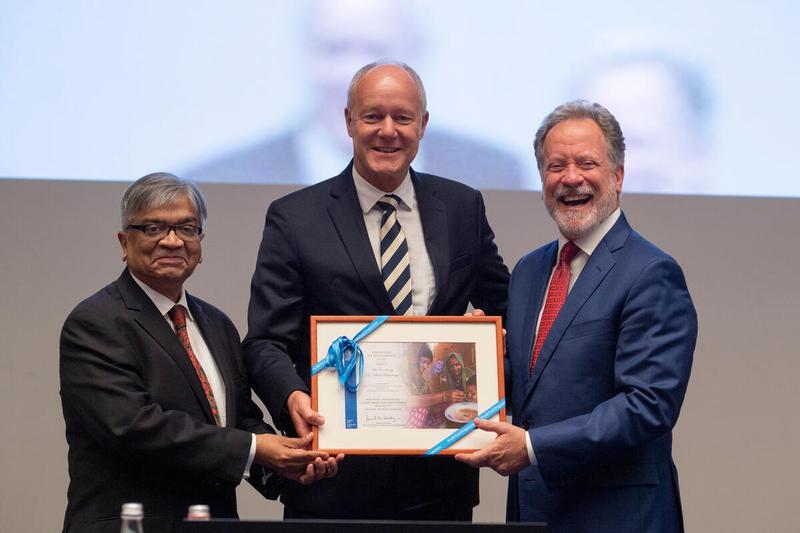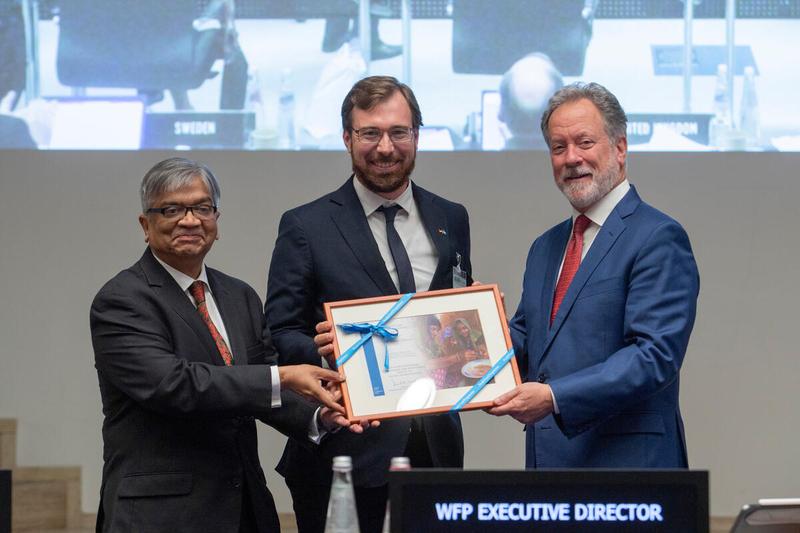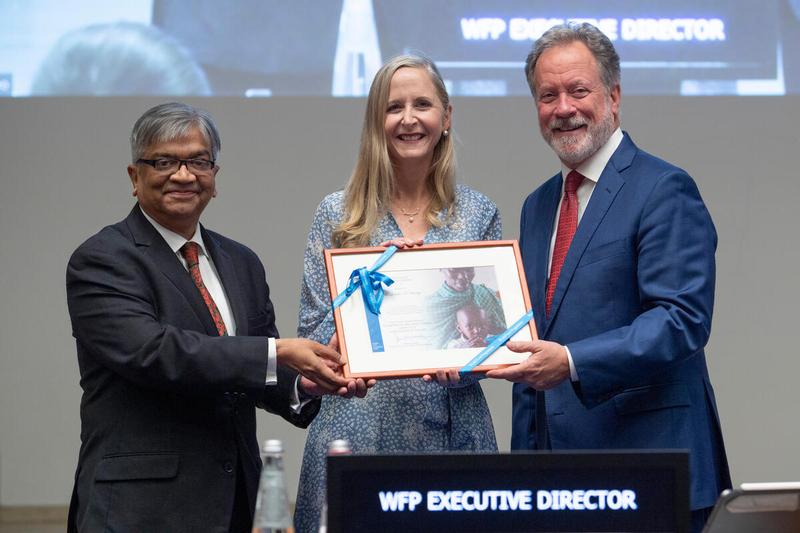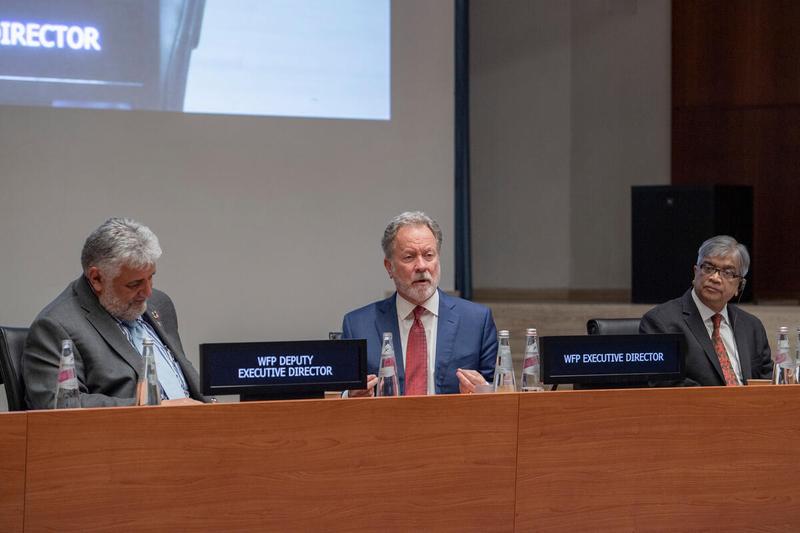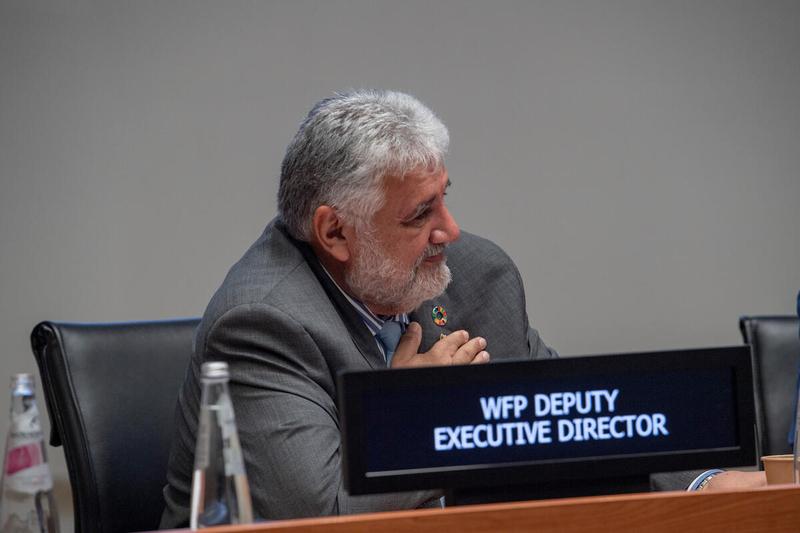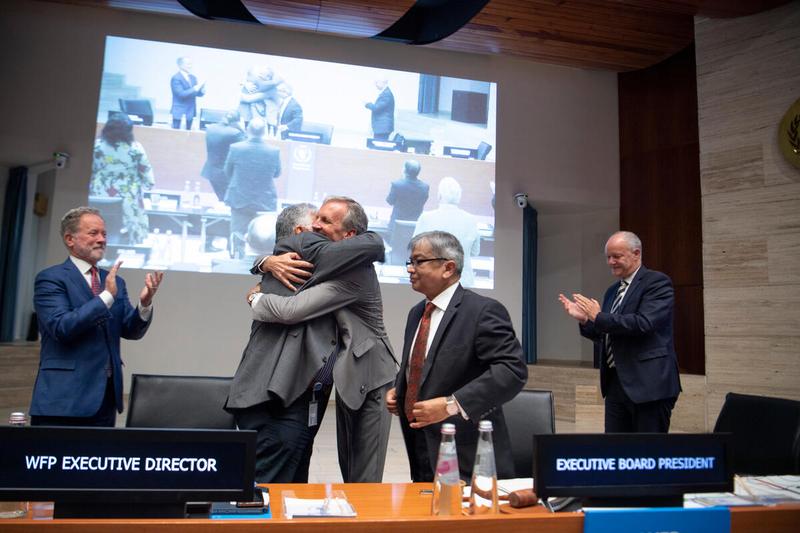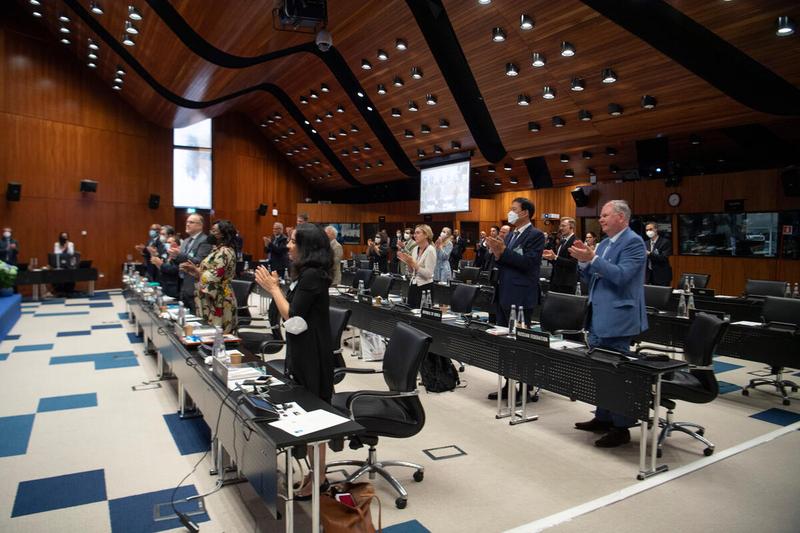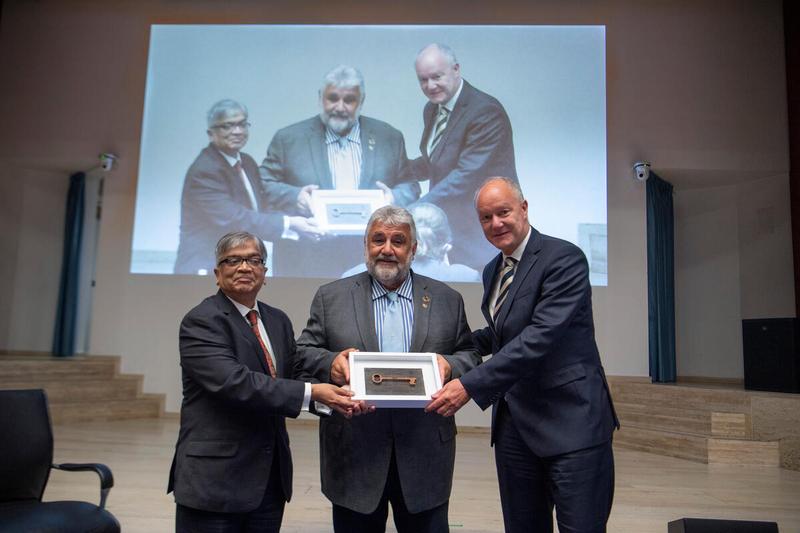The WFP has successfully concluded its 2022 Annual Session of the Executive Board. During this fruitful four and a half-day session 47 documents were presented for approval, consideration, or information. The session also featured a high-level panel discussion, two special guests and several side events.
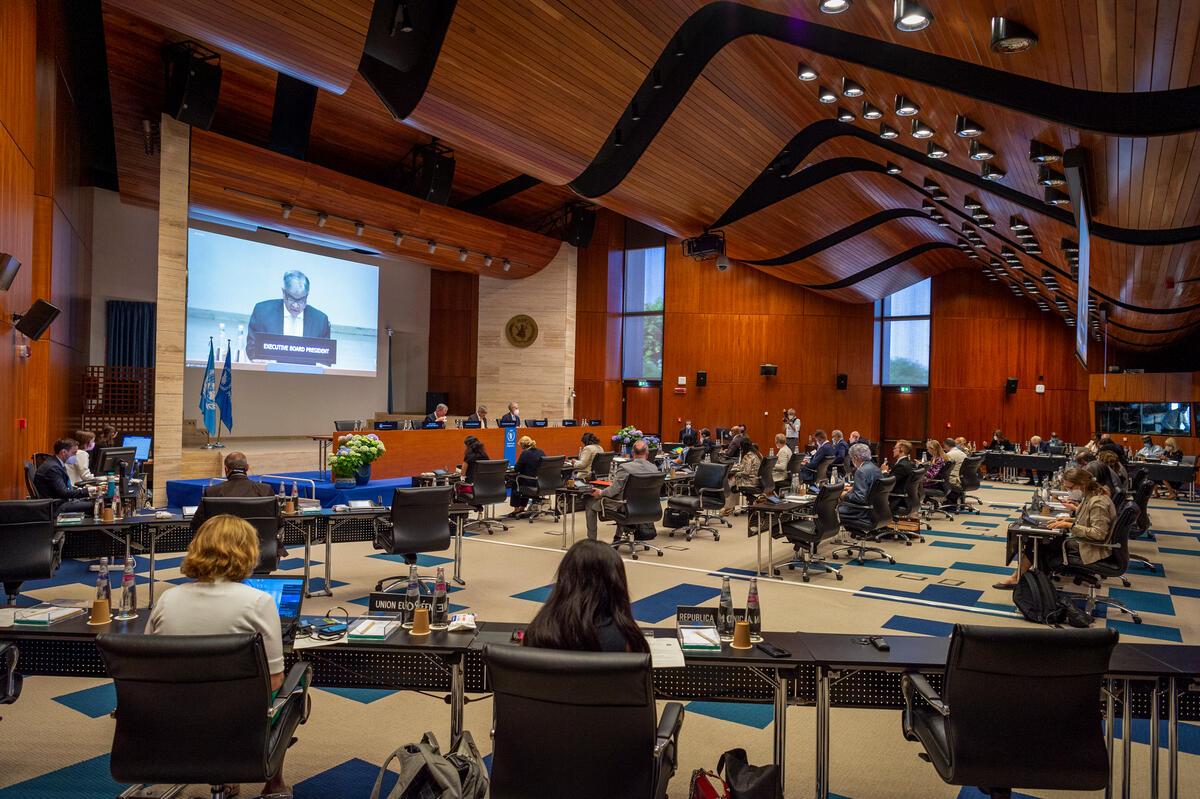
In the Photo: opening remarks by H.E. Md. Shameem Ahsan, President of the WFP Executive Board 2022. Photo: WFP/Giulio d'Adamo
The meeting took place in a hybrid format, with in-person presence in the auditorium of one delegate for each of the 36 EB members, plus one representative from the European Union as permanent observer. A second representative for each Mission was able to follow the proceedings of the session from various meeting rooms in the headquarters. All other participants attended through virtual means on Zoom.
Opening remarks by the Executive Director
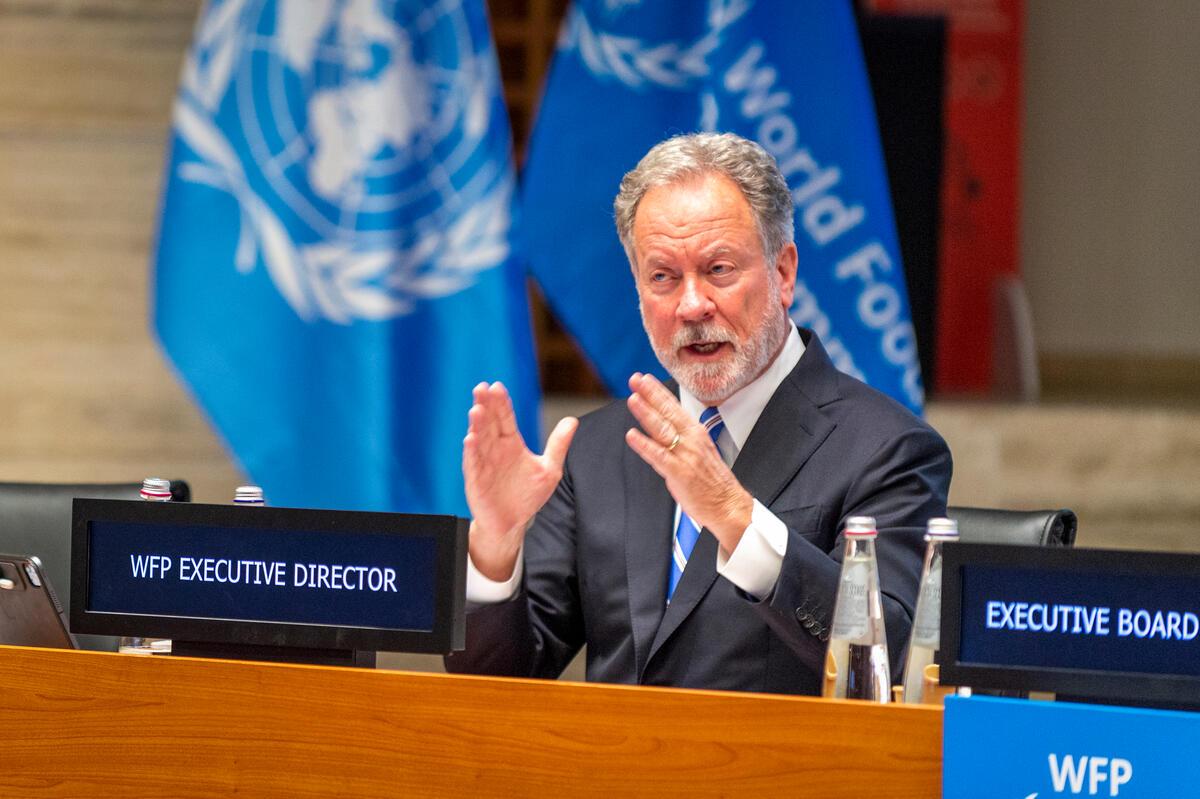
In the photo: Opening remarks by Mr. David Beasley, WFP Executive Director. Photo: WFP/Massimo Tartaglia
The first day commenced with the opening remarks of the Executive Director. David Beasley affirmed that the world is facing a global hunger crisis of unprecedented proportions with 345 million people facing acute food insecurity. This number has increased from 276 million at the beginning of the year and is expected to get worse.
As Beasley said the war in Ukraine has compounded an already dire food security situation driven by COVID, conflict, climate change and economic shocks to significantly increase the number of people facing acute food insecurity.
The ED mentioned the Odessa port being blocked for key suppliers to the global wheat market causing the general increase of global food prices. Similarly the ED showed concern about the steadily increasing oil prices and the spiking cost of fertilizer driving hunger to unprecedented levels.
Beasley also emphasised the urgency of climate change action. Climate shocks like the droughts in the Horn of Africa drive displacement like in the Tigray region of Ethiopia, where the ED recently visited, displacement camps increased from a couple of hundred to 8,000 just in the last 30 days due to lack of water.
Finally, the Executive Director warned that despite the fact that WFP is forecasting a record $10-12 billion in contributions for this year, the organization needs $22 billion to meet unprecedented needs in 2022. Growing needs continue to outpace levels of funding, widening the resourcing gap and forcing the organization to cut food assistance in countries like South Sudan and Yemen.
High-level panel on the implementation of the humanitarian-development-peace Nexus at country level
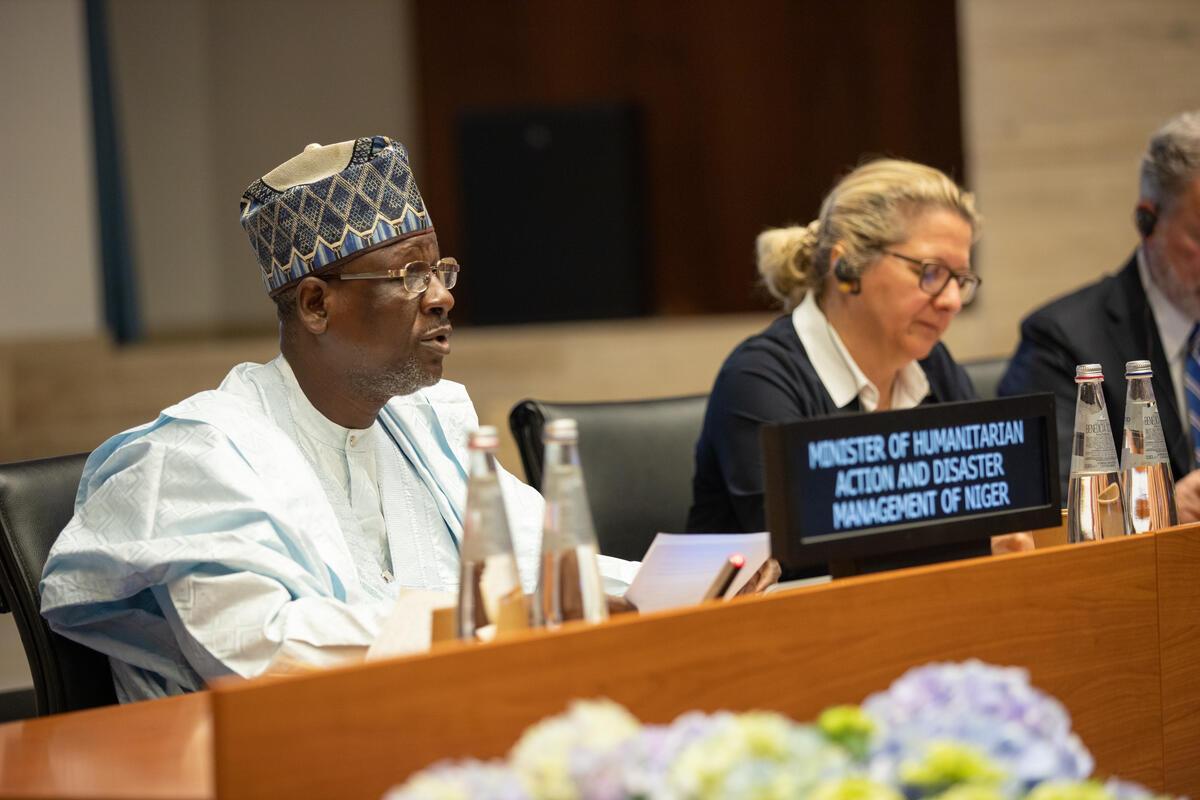
In the Photo: H.E. Laouan Magagi, Minister of Humanitarian Action and Disaster Management of Niger and H.E. Svenja Schulze, Federal Minister for Economic Cooperation and Development of Germany. Photo: WFP/Massimo Tartaglia
The morning session was followed by a high-level panel entitled “Implementation of the humanitarian-development-peace nexus at country level”. This panel discussion, co-sponsored by the governments of Germany and Norway, included the participation of several Ministers of the WFP Members States and was moderated by Valerie Guarnieri, Assistant Executive Director, Programme and Policy Development Department.
Her Excellency Svenja Schulze, Federal Minister for Economic Cooperation and Development of Germany (BMZ) opened by inviting all the participants to join the Global Alliance for Food Security that has been recently launched by the G7 and the World Bank with the aim to bring together governments, multilateral organizations the private sector and civil society against hunger under one umbrella and coordinate international efforts.
According to the Federal Minister for Economic Cooperation and Development of Germany the only way to effectively cope with multiple complex crises and prevent new ones is to adopt a holistic approach combining humanitarian aid, development cooperation and peacebuilding.
H.E. Schulze then described some of the WFP activities supported by her ministry. First, the national social protection programme in Lebanon that involves cash transfer modalities to address to the most vulnerable families; second, the Nexus project aiming at improving livelihoods and social cohesion in Burkina Faso and Niger; third, the WFP-UNICEF-FAO joint programme run in eight African countries which pools the expertise of the three agencies to address multiple crises.
Her Excellency Anne Beathe Tvinnereim, Minister of International Development of Norway explained that the Nexus approach is based on the complementarity between the humanitarian actors saving lives and development and peace actors addressing the roots and causes of conflicts and vulnerability.
H.E. Tvinnereim remarked that “Norway is committed to providing flexible, unearmarked humanitarian financing and bridging the gap between the long-term development and humanitarian assistance” and stressed the importance of prevention and early action to reduce vulnerability and humanitarian needs.
In this regard, the Minister of International Development of Norway mentioned some examples of how the combination of developmental efforts and humanitarian action are effective in building resilience. These include WFP’s homegrown school feeding programmes as well as forecast-based financing and anticipatory action – like early warning systems, social protection programmes and vulnerability analysis – that are conducted in such countries as Niger, Madagascar, Mozambique and Zimbabwe.
His Excellency Amin Salam, Minister of Economy and Trade of Lebanon provided an insight into the crisis that his country has been facing in the last years where the sharp decline in the economy coupled with COVID-19 pandemic outbreak and rising inflation have left around 82 percent of the population experiencing deprivation in at least one poverty dimension.
H.E. Salam mentioned the Reform, Reconstruction and Recovery Framework (3RF) and Beirut Rapid Damage Needs Assessment as examples of HDP Nexus plans to respond to the crisis derived from the Beirut explosion in Summer 2020.
The Minister of Economy and Trade of Lebanon urged governments and the international community to to support farming to get Lebanon back to being a major agricultural player in the region with a self-sustainable production of food products.
The last panel speaker, His Excellency Laouan Magagi, Minister of Humanitarian Action and Disaster Management of Niger shared his experience with the implementation of HDP Nexus in Niger. In this country in 2011 the programme “Nigériens Nourrissent les Nigériens” (Nigerians Nourishing Nigerians) was launched as a multi-sectoral initiative to increase agricultural productivity, while building the resilience of farmers and reducing malnutrition. This approach has had positive results showing evidence of better resilience in those villages where these activities were conducted after the great shortages in 2021.
H.E. Magagi thanked all partners and countries that have supported Niger in this approach and launched an appeal “for strategic coordination and strengthened dialogue at all levels, for enhanced security in fragile areas to ensure better humanitarian access, to the quest for sustainable solutions for the displaced populations and for flexibility in fund mobilization and management”.
Special address by the Vice President of Benin
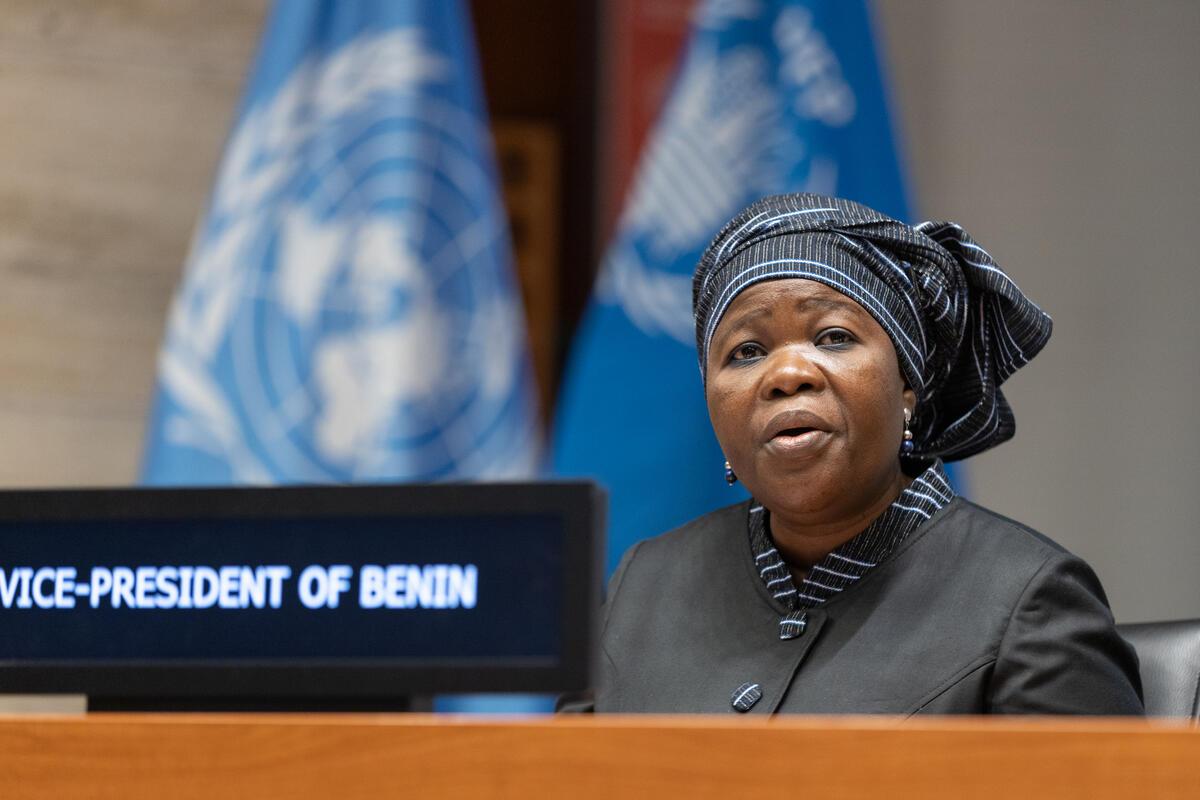
In the Photo: intervention by H.E. Ms. Mariam Chabi Talata Zimé, Vice President of Benin. Photo: WFP/Massimo Tartaglia
On Monday afternoon the session reconvened with the address by a special guest, Her Excellency Mariam Chabi Talata, Vice-President of the Republic of Benin who spoke on Benin’s leadership and experience in school feeding.
H.E. Chabi Talata, on behalf of H.E. Patrice Talon, President of the Republic of Benin, expressed boundless gratitude for being nominated champion of the Global School Meals Coalition and announced to invest more on these programmes with a budget increase from 51 billion to 150 billion CFA francs for the next five years.
Benin’s Vice-President explained that a cost-effectiveness analysis conducted in 2018 showed that every dollar invested in the school feeding programme can generate up to USD 5.2 in economic impact for the country's GDP. The same study confirmed that these benefits had been amplified by the purchase of local products boosting the incomes of small producers, women and youth groups as well as cooperatives.
As H.E. Chabi Talata said, the programme initially covering 31 percent of children, has now reached a coverage rate of 51 percent of children and Benin is planning to extend it up to 75 percent of beneficiaries including solutions for urban areas.
The Vice-President of Benin concluded her speech by stressing that “The world needs peace to build its future. And it needs school feeding and school canteens to healthily feed the builders of tomorrow's world ”.
Special address by the UNICEF Executive Director
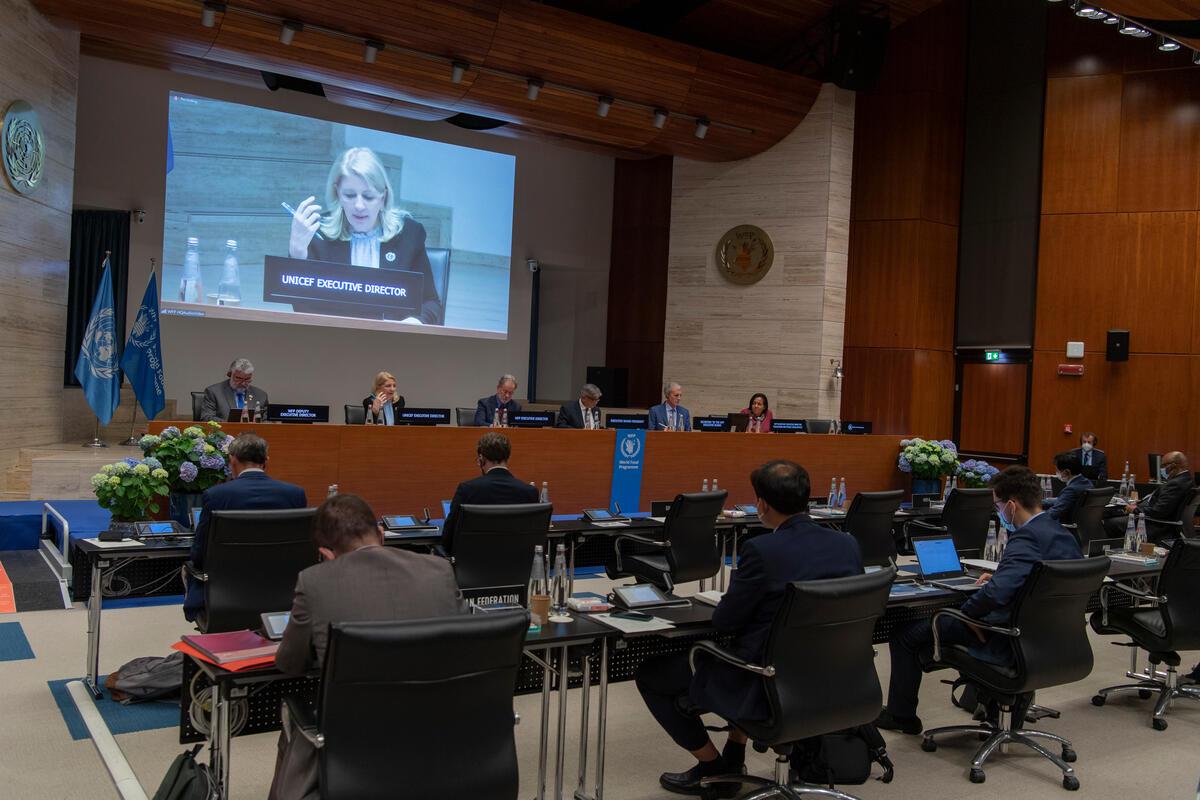
In the Photo: Speach by guest speaker Ms. Catherine Russell, Executive Director of UNICEF. Photo: Rein Skullerud
On Thursday afternoon the WFP Executive Board opened with a special address by Ms Catherine Russell, Executive Director of UNICEF on the importance of strengthening partnerships between the major humanitarian actors, particularly in the field of nutrition and food security, in order to face the unprecedented number of crises around the world.
The Executive Director of UNICEF said she was proud of the work that WFP and UNICEF are doing together to strengthen their partnership and she gave her personal commitment to carry this forward.
Russell showed concern over the escalating hunger crisis now exacerbated by the impact of the war in Ukraine on the global food supply and urged collective action to reach the most vulnerable people.
UNICEF’s ED talked about her recent visits to the Kandar province of Afghanistan and the Horn of Africa where “UNICEF stands shoulder to shoulder with WFP to develop joint responses to meet the nutritional needs of millions of women and children”.
Russell concluded remarking that the scale of the current crisis demands an unprecedented response from UNICEF, WFP and other partners around the world and that this linked approach has never been more essential or more urgent than now. “WFP and UNICEF now have a historic duty to co-develop an ambitious, complimentary transformative vision to avert a hunger and nutrition crisis on a scale not seen in more than a generation”.
Special segment to honour WFP Deputy Executive Director in occasion of his retirement
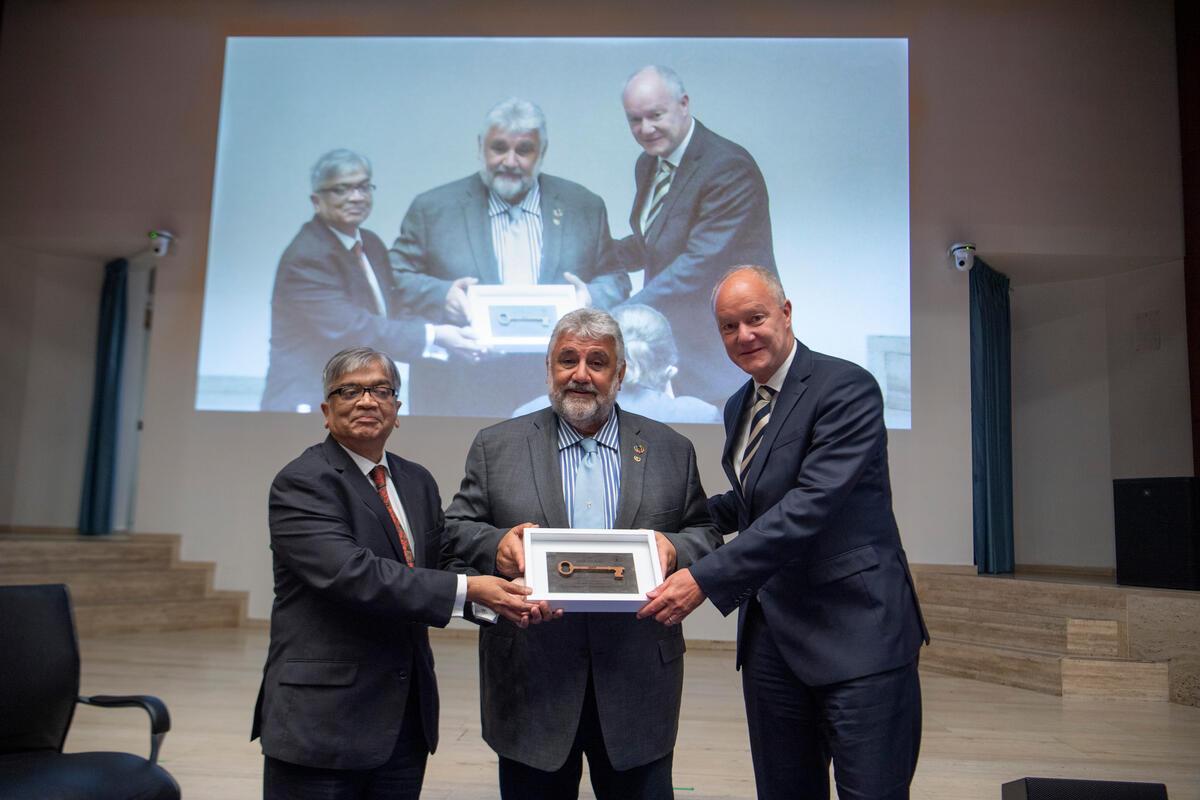
In the Photo: The Executive Board pays tribute to Mr. Amir Mahmoud Abdulla outgoing Deputy Executive Director after a remarkable 31 year career with WFP. As a sign of appreciation for his contributions to the EB over the years Mr. Amir Mahmoud Abdulla, Deputy Executive Director receives a Key to WFP Executive Board. Photo: Rein Skullerud
On Friday morning the Board ended with a special segment dedicated to Mr Amir Abdulla who will retire from the World Food Programme at the end of June, after a remarkable 31-year career within the organization.
The President of the EB, His Excellency Shameem Ahsan, thanked the DED for supporting the work of the Board with deep commitment. H.E. Ahsan expressed appreciation to Mr Abdulla for his enormous contribution to the WFP, and particularly to the work of the Board, and showed admiration of his “ability to communicate passionately, bring people together and constantly advocate for WFP's mission to assist the world's most vulnerable people”.
Having started as a Logistics Officer in 1991 and having served the organization in different functional roles – as Director of Budget, Regional Director in both the Middle East and Southern Africa, Chief Financial Officer and then as Deputy Executive Director since 2009 – Mr. Abdulla has truly embodied WFP’s humanitarian spirit.
His Excellency Dr. Ulrich Seidenberger, Former Executive Board President, also commended Mr. Abdulla for being a “consensus builder” as well as the “embodiment of RBA collaboration”. ”Amir has at heart, not only the best interest of the Organization but first and foremost, the interest of its staff and the beneficiaries. And that has driven us, Board members, to do better ourselves.”
After the ED remarks, the Board was shown a video with recorded messages from former WFP executive directors and colleagues acknowledging the enormous contributions that Amir has made to WFP over the years.
Mr. Abdulla thanked the Board for these appreciation messages and concluded his farewell speech to the Board by quoting Dr Seuss from “Cat in the Hat” who said "Don't cry because it is over, smile because it happened". He also quoted Peter Pan who said when Wendy was leaving him "Never say goodbye. Never say goodbye, because goodbye means going away, but going away means forgetting. But I will never forget any of you.”
Mr. Abdulla finally received a Key to the WFP Executive Board as a symbolic gift to acknowledge his enormous contributions to the EB over the years.
Key Documentation
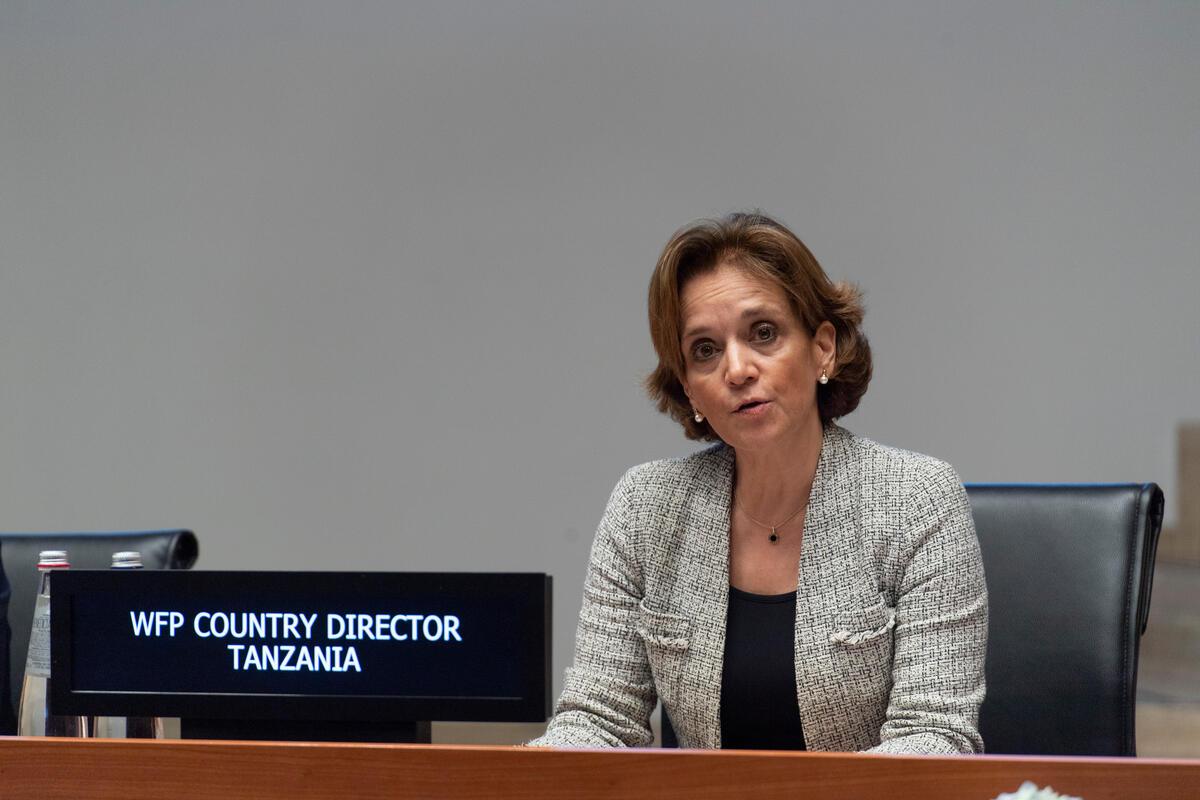
In the Photo: Presentation by Ms. Sarah Gordon-Gibson, WFP Country Director Tanzania. Photo: Rein Skullerud
At this session, the Board approved a Country capacity-strengthening policy update, six Country Strategic Plans: China, El Salvador, Mozambique, Tanzania, Togo, Zimbabwe. Additionally, two CSP evaluation summary reports were examined for consideration: Mozambique, and Tanzania.
The EB also approved the Annual performance report for 2021 and an Update on the WFP management plan (2022–2024) showing a 23 percent increase in the operational requirements up to $17.1 billion. As part of the Update, the Board approved $185 million USD in allocations to the Immediate Response Account, to establishing a changing lives transformation Fund (CLTF) and and allocation to the Emerging Donor Matching Fund.
Other key documents included an Update on food procurement and the Annual evaluation report for 2021.
Click here to find all decisions and recommendations.
Side events
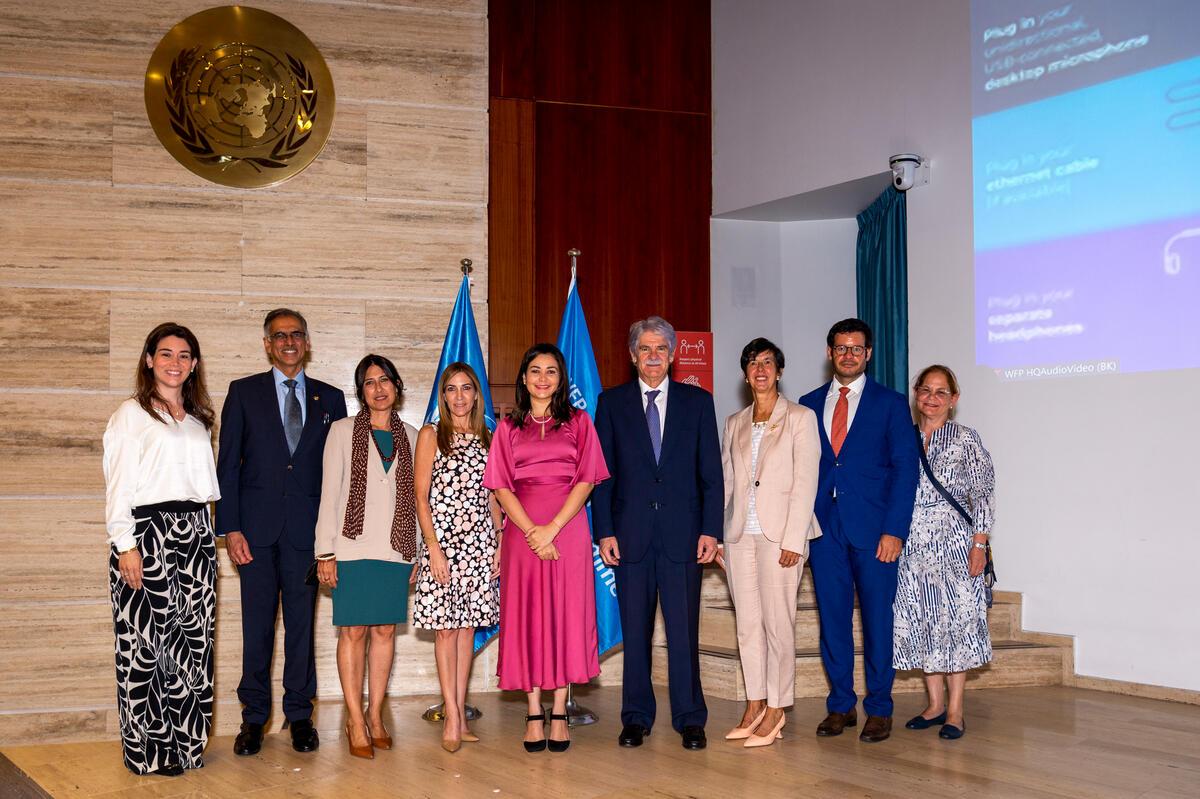
In the Photo: "Group of Friends of the United Nations Humanitarian Response Depot" side event on the margins of the Annual Session of the Executive Board 2022 (EB.A/2022). Photo: WFP/Giulio d'Adamo
Four side events were held during this session:
• On Monday, “Robin Food - a feast based on rescued vegetables and fruits, emphasizing the opportunity in food waste prevention”.
• On Wednesday morning, “Launch exhibit on Migration in the Americas: Migratory routes and motivations of people on the move”.
• On Wednesday afternoon, Group of Friends of the United Nations Humanitarian Response Depot.
• On Thursday the side event on Disability Inclusion in Action: What works? Lessons from an evaluation by the WFP-Trinity College Dublin Partnership.
Further information regarding these side events is available here, under the Side Events and Exhibitions tab.

